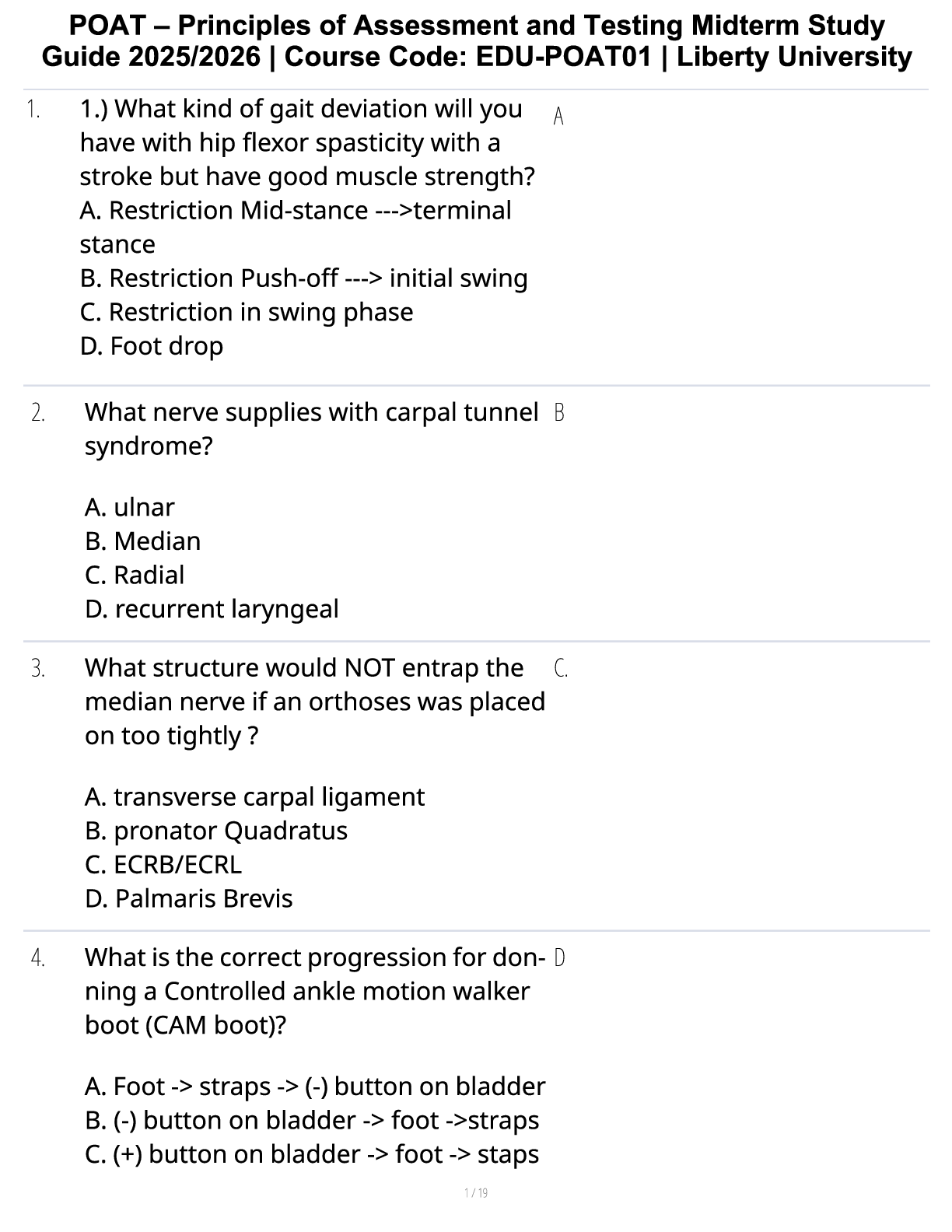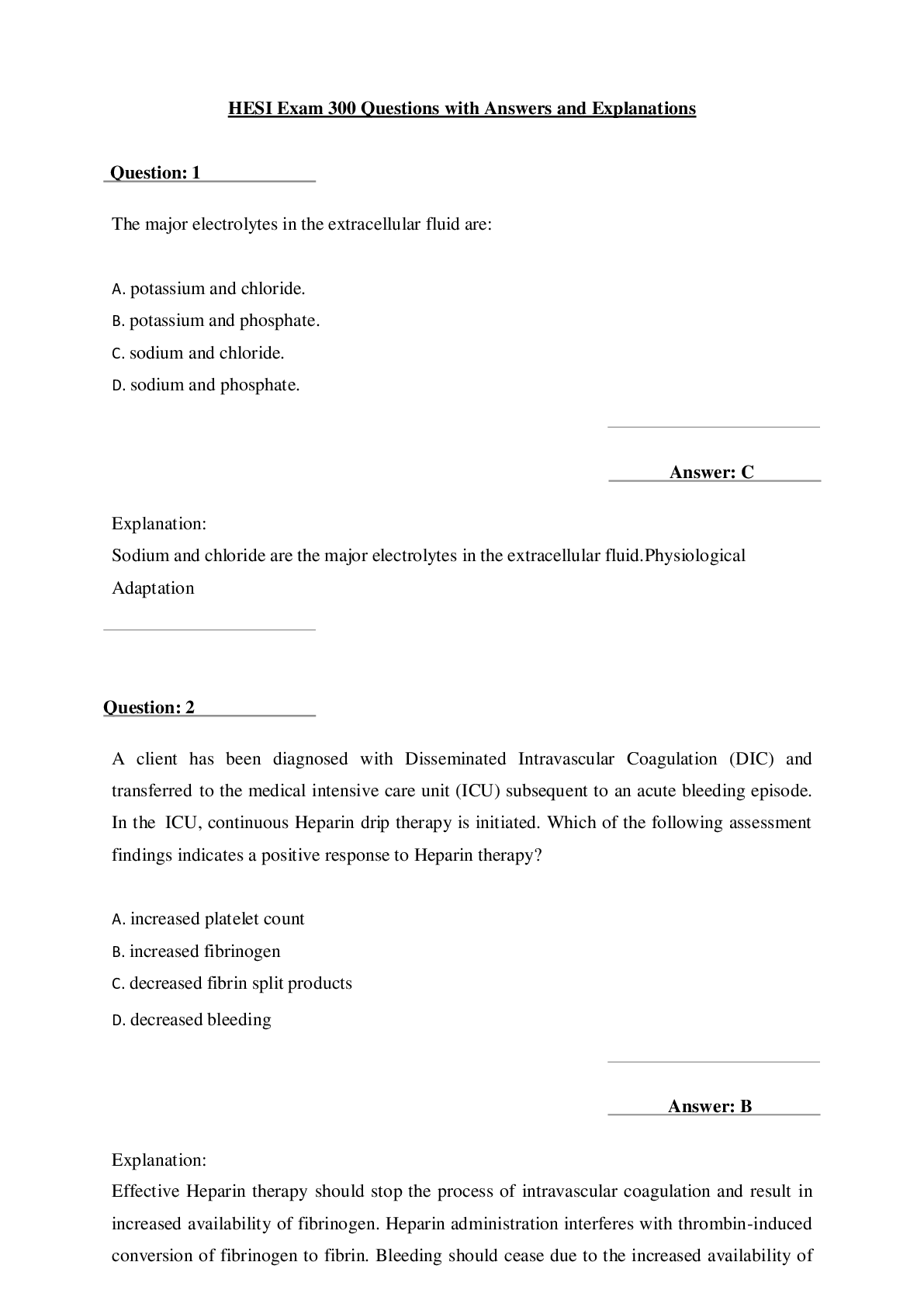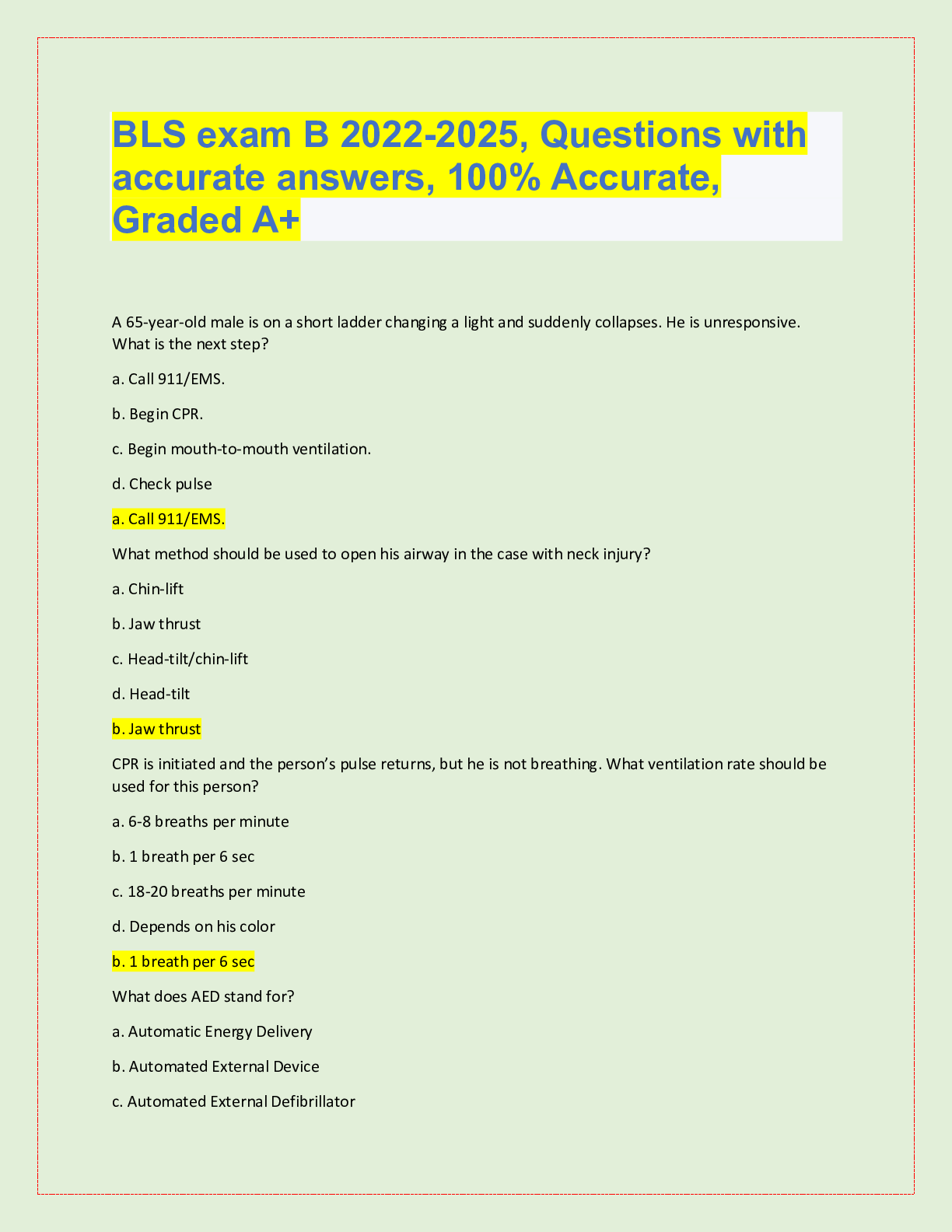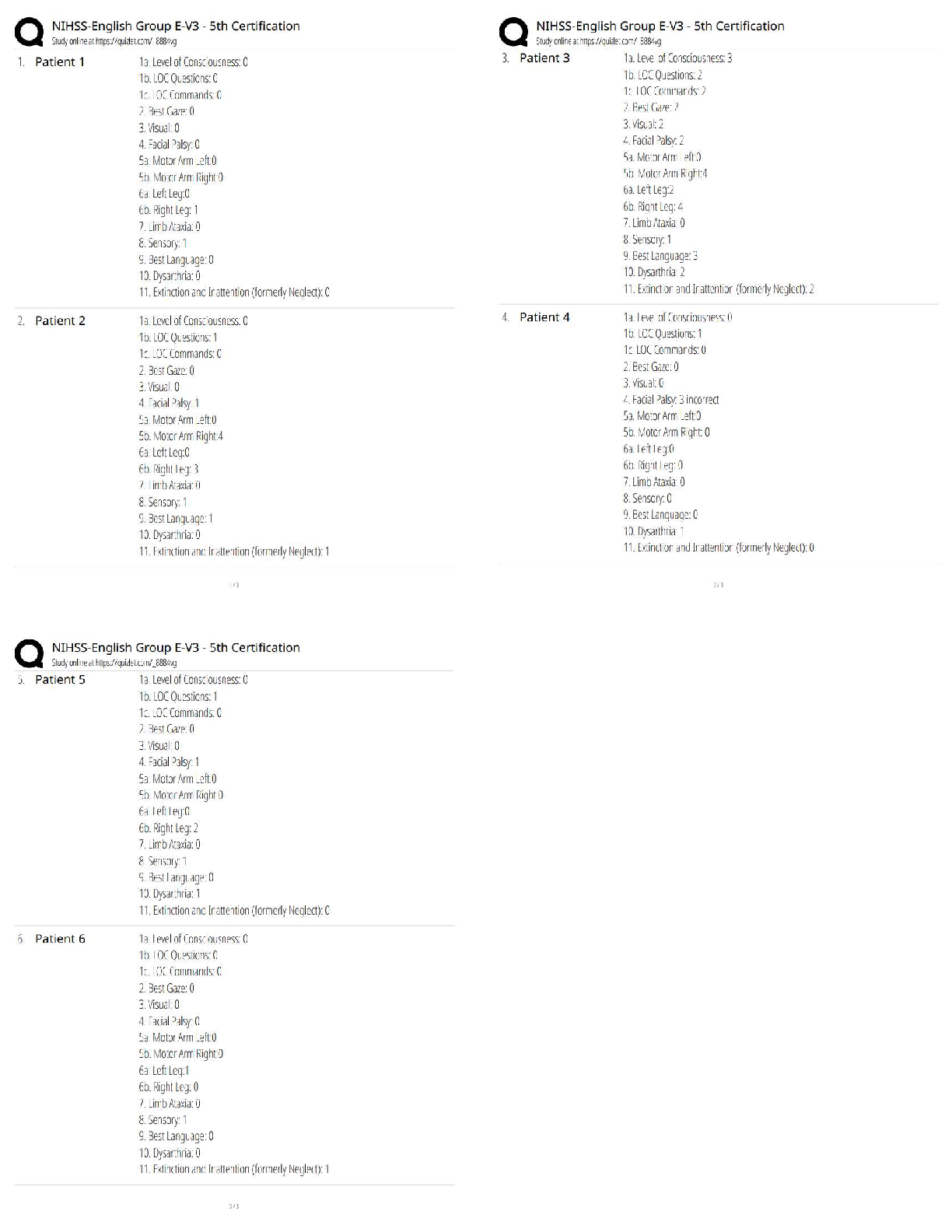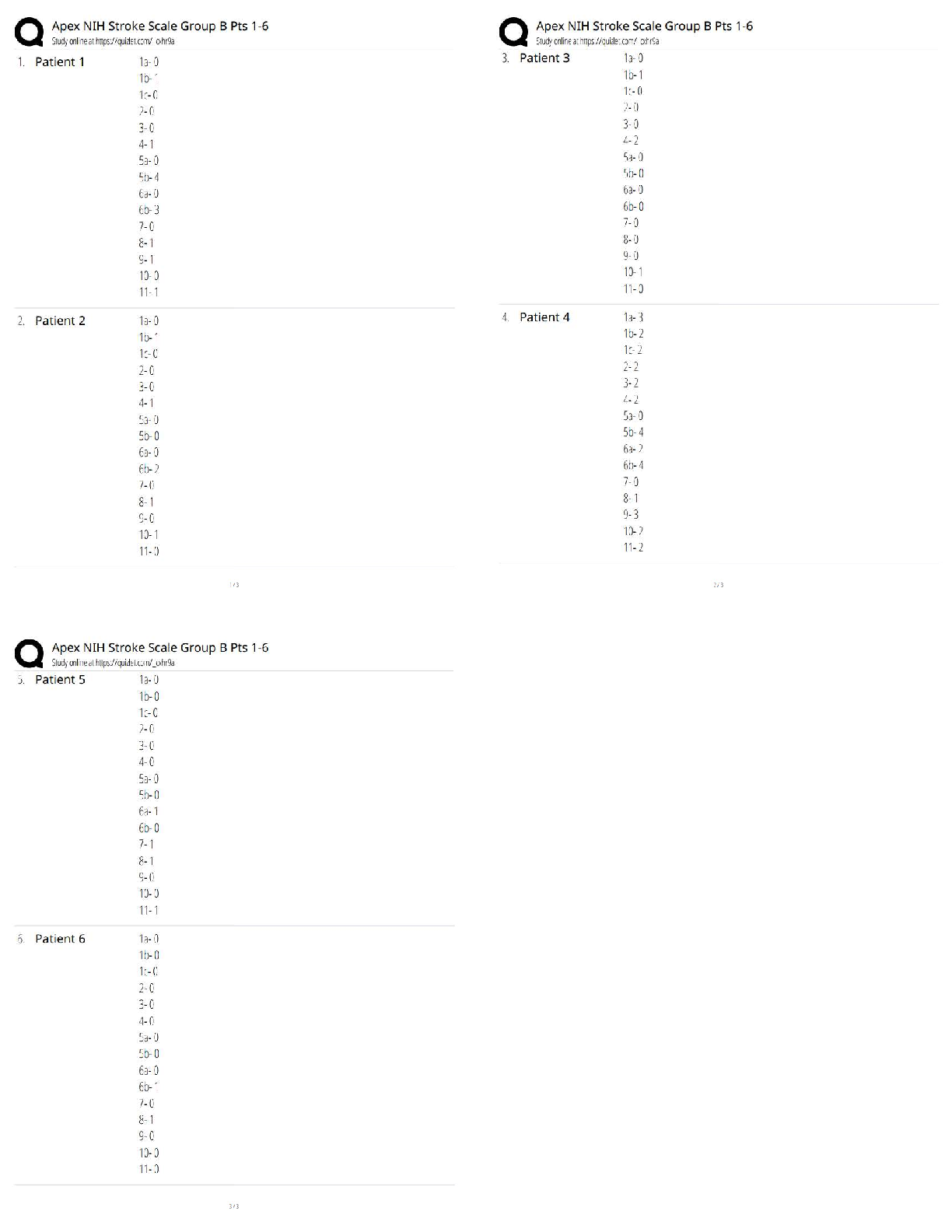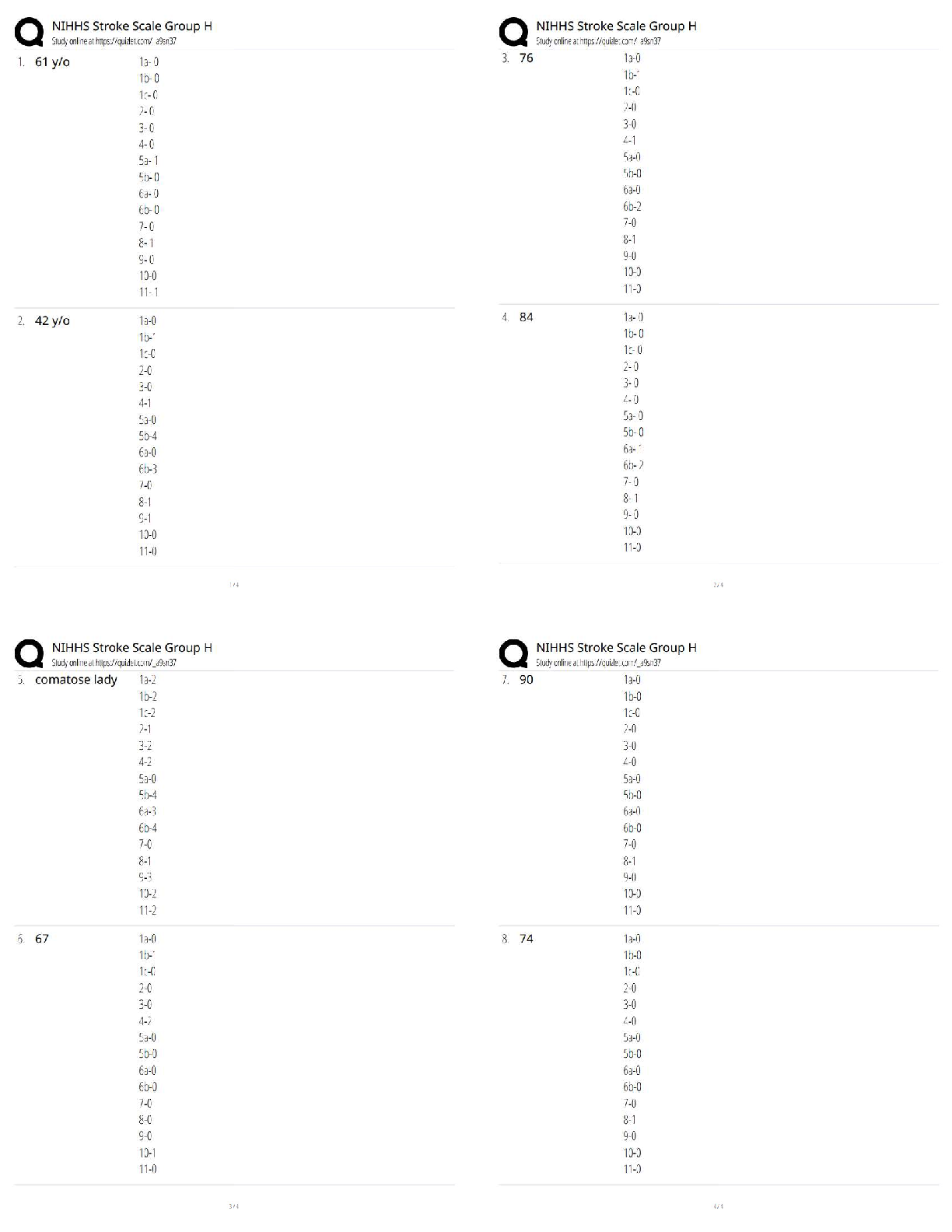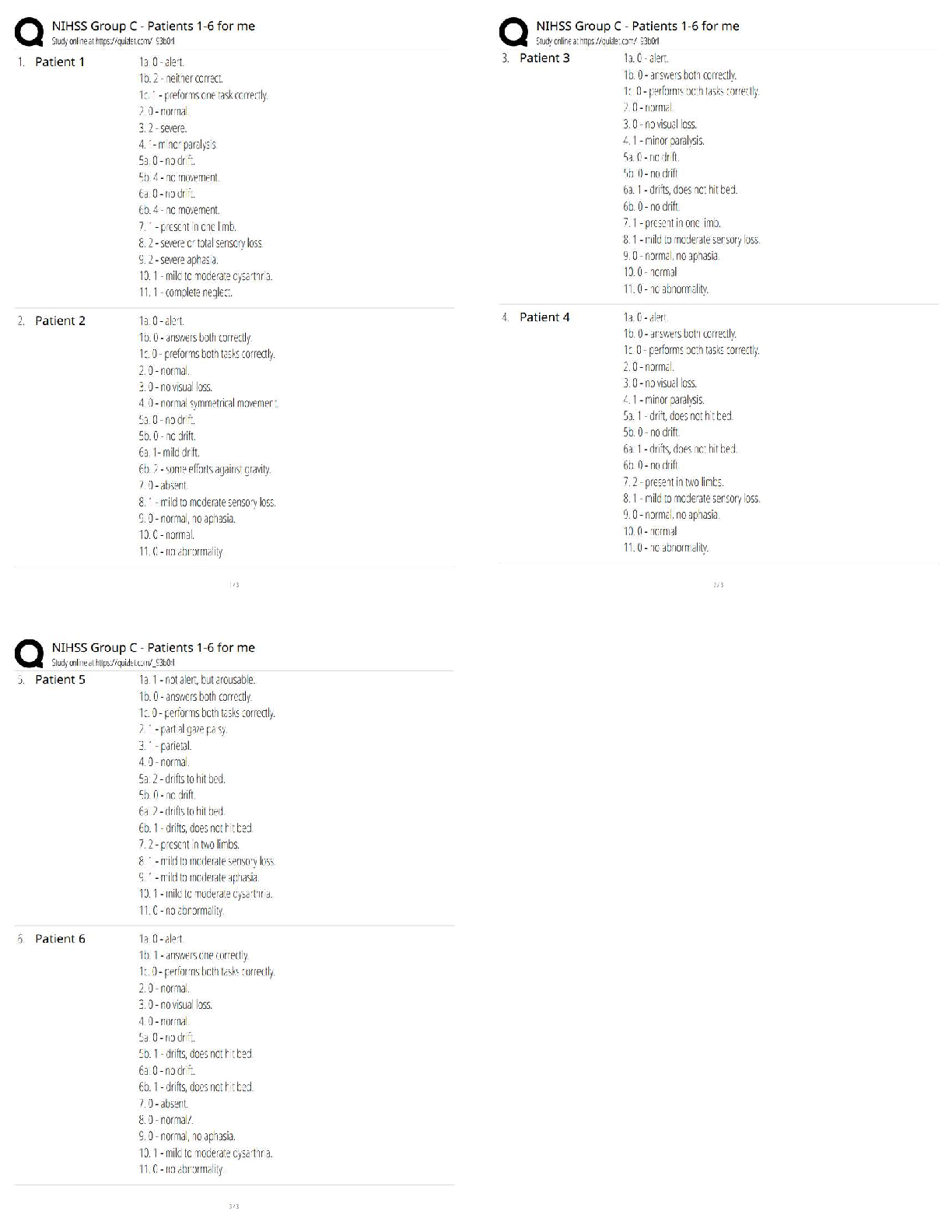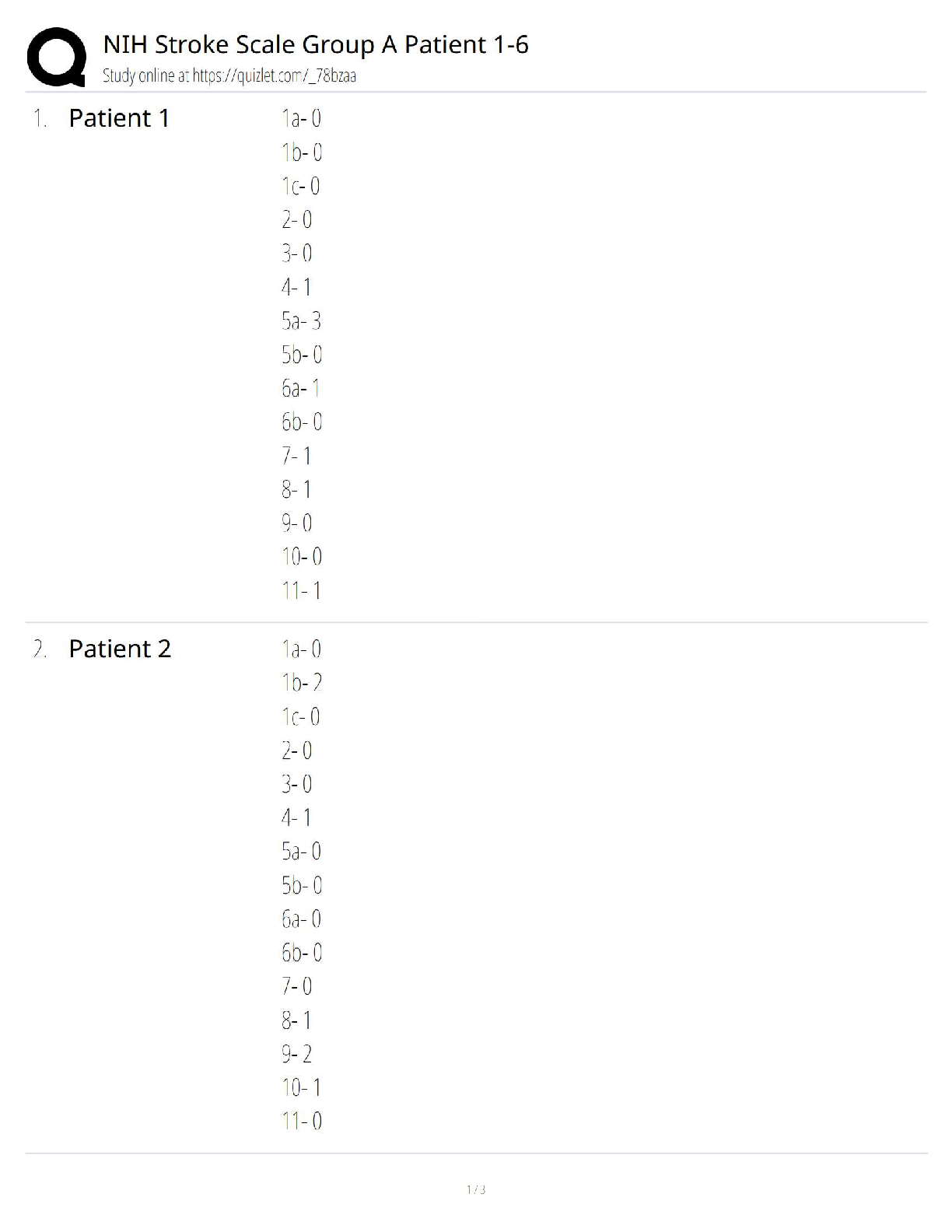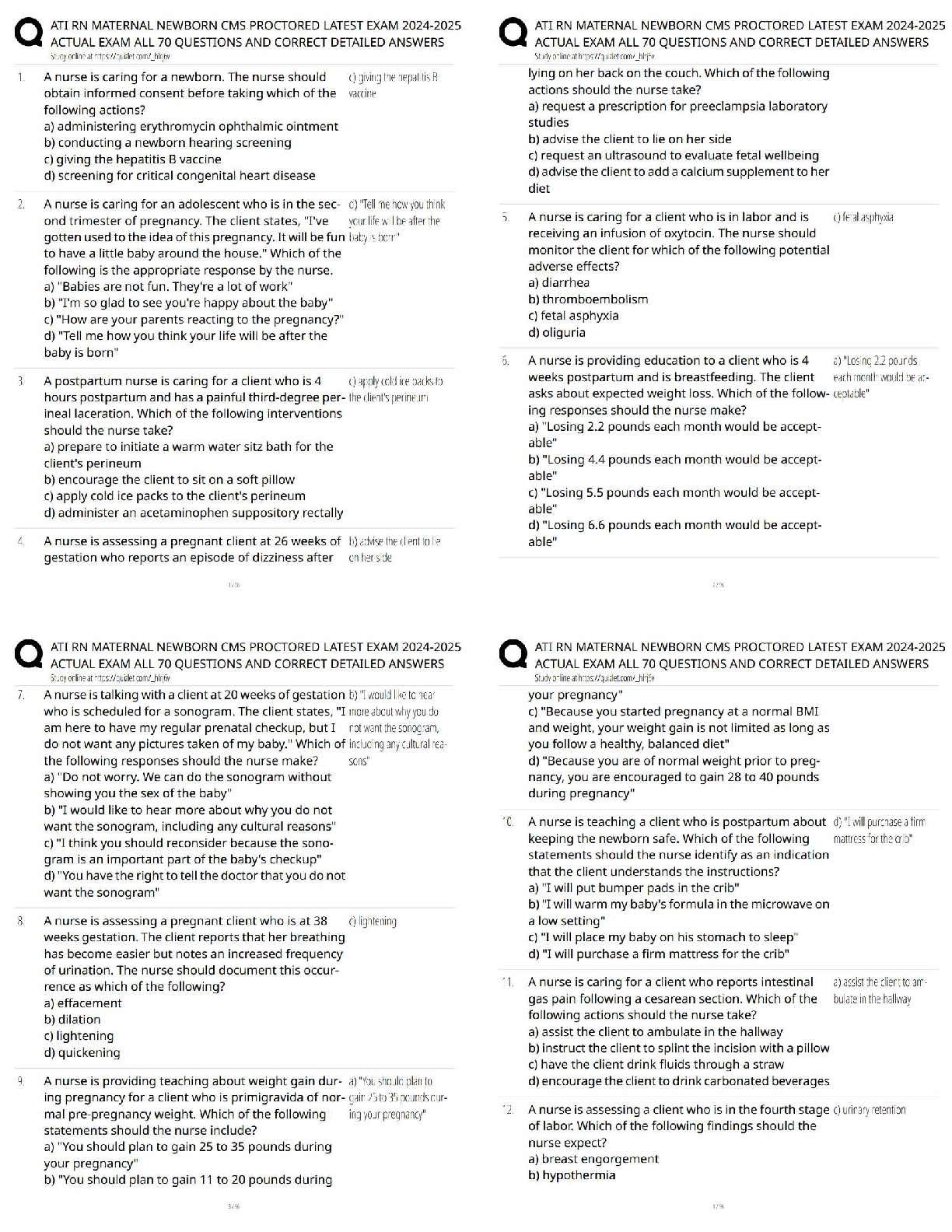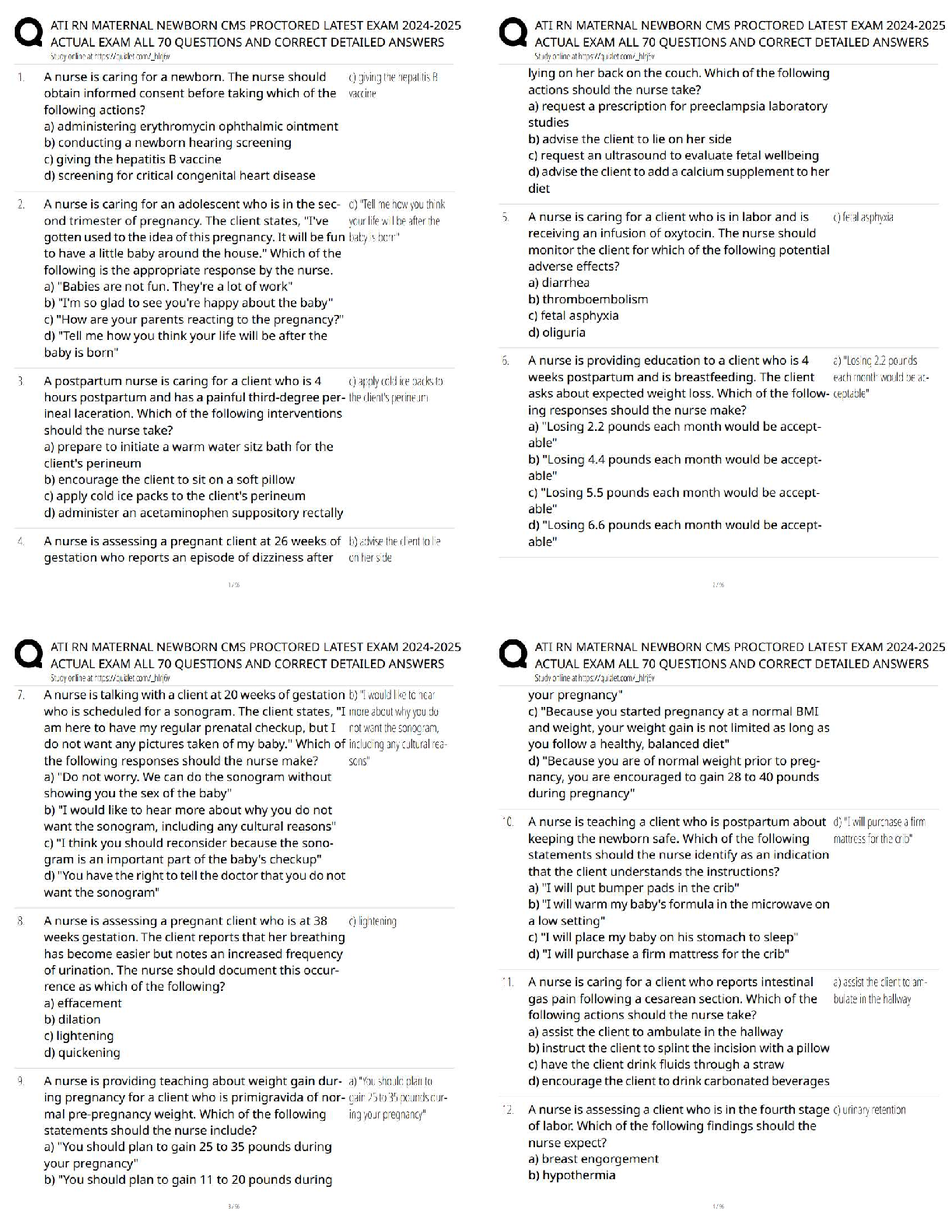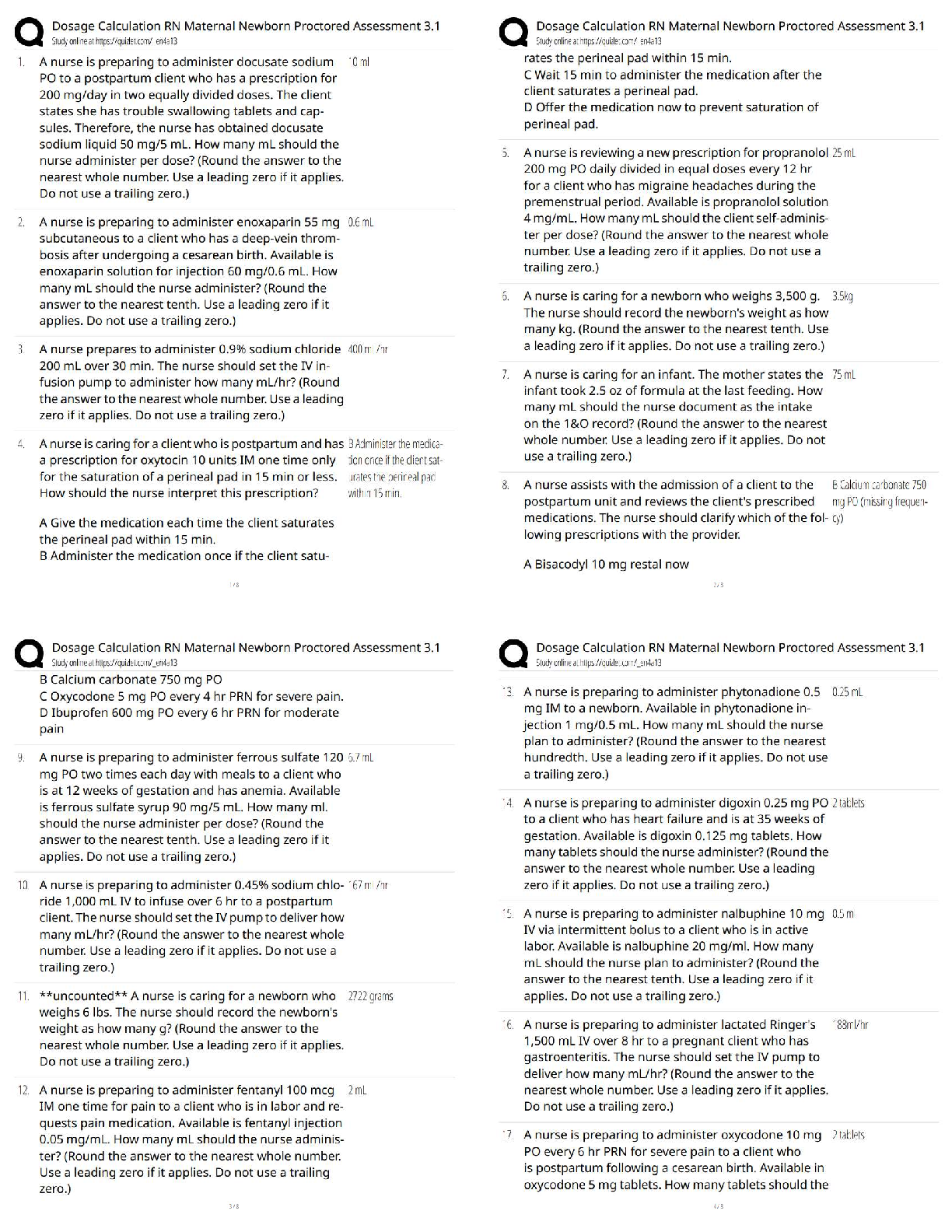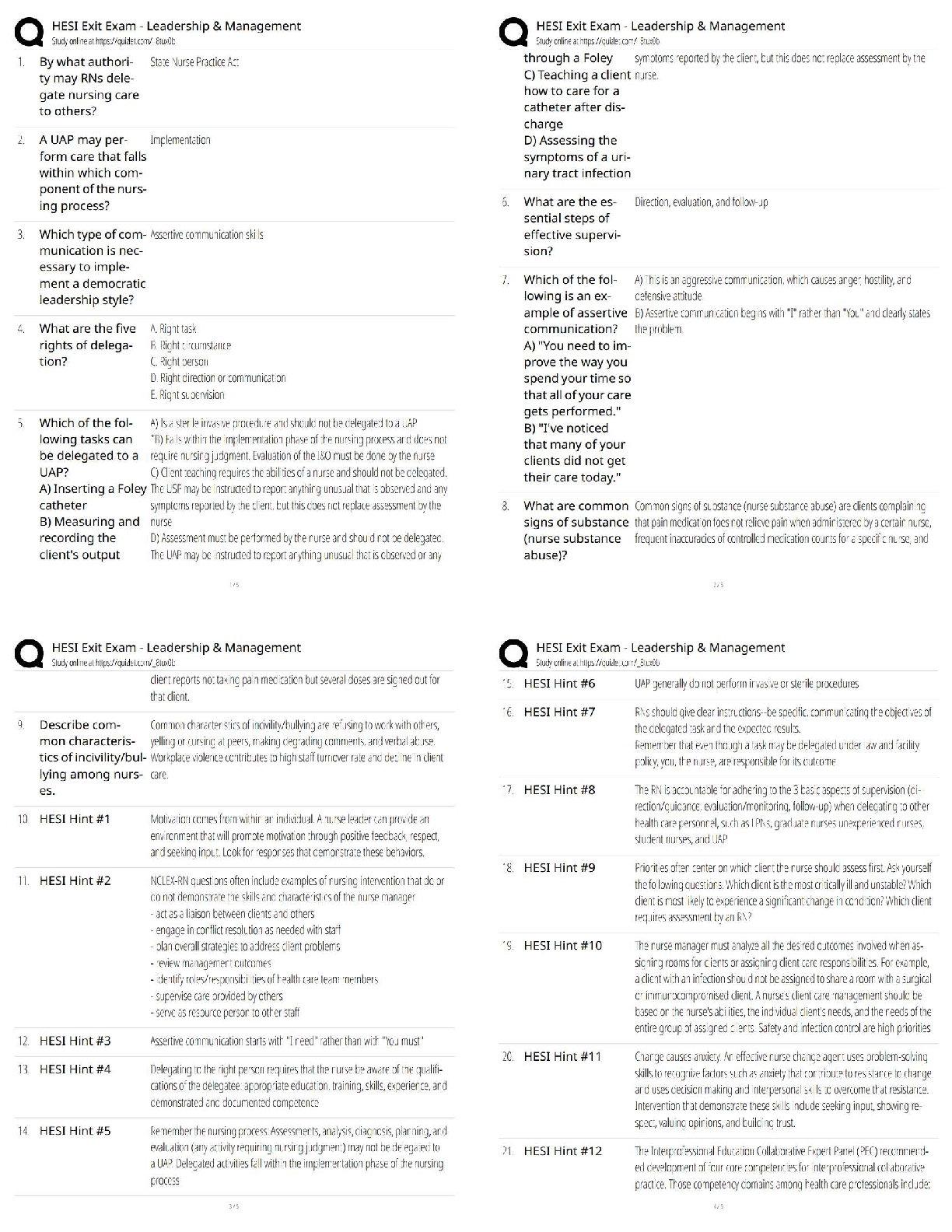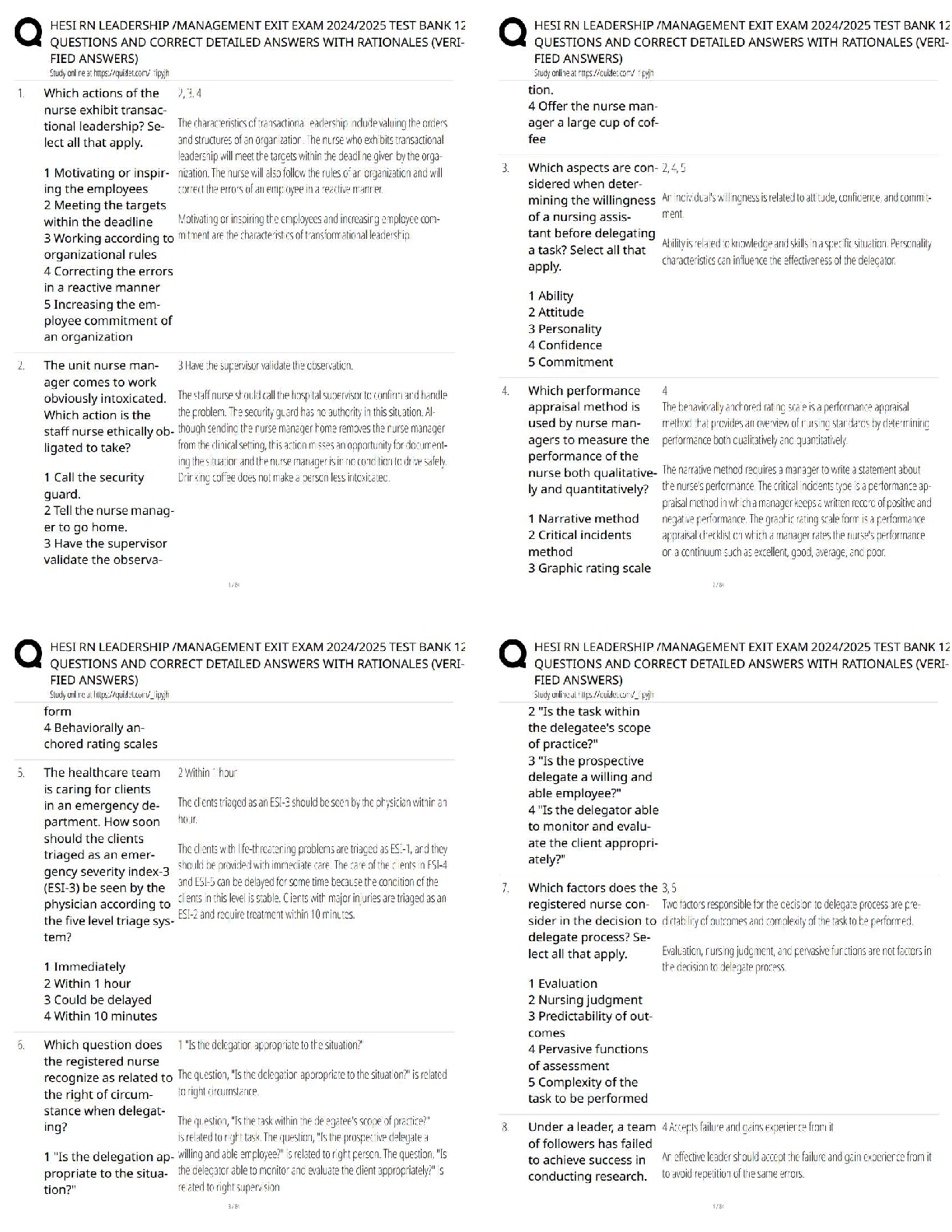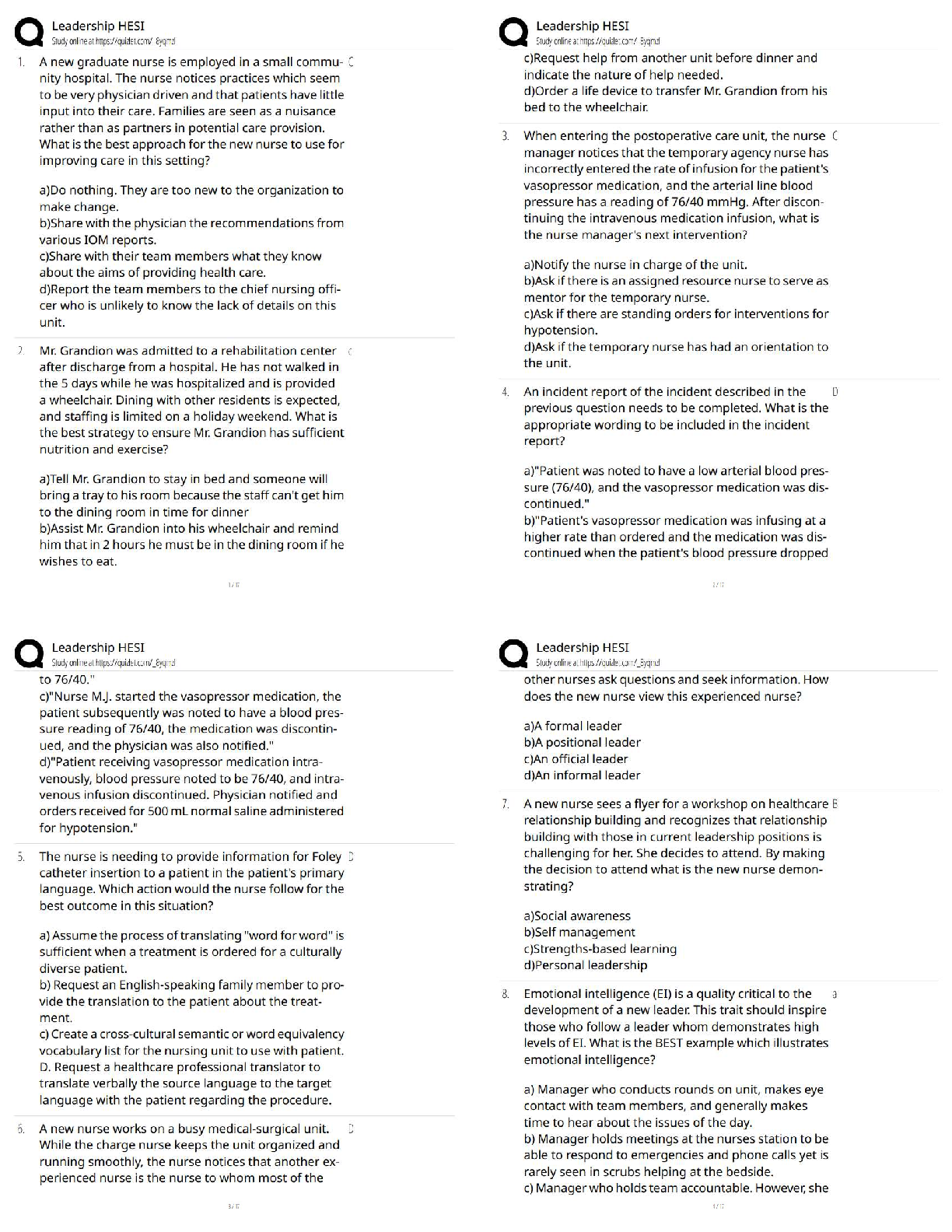WGU - Introduction to Psychology - C180. Exam Review, Full Coverage. Verified.
Document Content and Description Below
WGU - Introduction to Psychology -
C180. Exam Review, Full Coverage.
Verified.
Research Hypothesis - ✔✔-A precise statement of the presumed relationship among specific parts of a
theory; A s
...
pecific and falsifiable prediction about the relationship between or among two or more
variables.
Theory - ✔✔-An integrated set of principles that explains and predicts many, but not all, observed
relationships within a given domain of inquiry.
Steps to construct a hypothesis - ✔✔-Step 1: A real life problem or phenomenon is observed
Step 2: Theory: An organized system of assumptions that seeks to explain the phenomena or real life
problem.
Step 3: Hypothesis: A statement that attempts to predict or account for a phenomena by specifying a
relationship between, or among, variables
Characteristics of Ethical Research - ✔✔-1. Trust and positive rapport are created between the
researcher and the participant.
2. The rights of both the experimenter and participant are considered, and the relationship between
them is mutually beneficial.
3. The experimenter treats the participant with concern and respect, and attempts to make the research
experience a pleasant and informative one.
4. Before the research begins, the participant is given all information relevant to his or her decision to
participate, including any possibilities of physical danger or psychological stress.
5. The participant is given a chance to have questions about the procedure answered, thus guaranteeing
his or her free choice about participating.
6. After the experiment is over, any deception that has been used is made public, and the necessity for it
is explained.
7. The experimenter carefully debriefs the participant, explaining the underlying research hypothesis
and the purpose of the experimental procedure in detail and answering any questions.
8. The experimenter provides information about how he or she can be contacted and offers to provide
information about the results of the research if the participant is interested in receiving it (Stangor,
2011, p.#).
Independent Variable - ✔✔-The causing variable that is created (manipulated) by the experimenter
Dependent Variable - ✔✔-The measured variable that is expected to be influenced by the experimental
manipulation
Population - ✔✔-All the people the researcher wishes to know about
Sample - ✔✔-The people chosen to participate in the research study
Descriptive Research - ✔✔-Research designed to provide a snapshot of the current state of affairs.
Correlational Research - ✔✔-Research designed to discover relationships among variables and to allow
the prediction of future events from present knowledge.
Experimental Research - ✔✔-Research in which there is a random assignment of research participants
into two groups. This is followed by a manipulation of a given experience for one group while the other
is not manipulated. One group is the experimental group that receives the manipulation. The other
group is the control group that does not. The two groups are then compared to determine the influence
of the manipulation.
Major elements of a psychological experiment - ✔✔-Scientific Method:
First, Observe a problem, then:
1. Form a hypothesis
2. Conduct research
3. Analyze data
4. Interpret data
5. Publish results
Biological Foundations - ✔✔-The study of the brain systems and sensory processes are an example of
what theme?
Potential and Dysfunction - ✔✔-Mental health psychologists are most likely to be concerned with which
topic?
Mental Health - ✔✔-A counseling psychologist is most likely to be working in which general area?
Basic Research to Applied Psychology - ✔✔-A psychologist has been working in a university for 15 years
and has an opportunity to work with a technology company that is just getting popular. She decides to
go for the money and work for the company. She has moved from:
Neurotransmitter - ✔✔-A chemical that relays signals across the synapses between neurons.
Neuron - ✔✔-Contains three parts: Soma, Dendrite, and Axon
Soma - ✔✔-A cell body which contains the nucleus of the cell and keeps the cell alive.
Dendrite - ✔✔-A branching, tree-like fiber which collects information from other cells and sends the
information to the soma.
Axon - ✔✔-A segmented fiber which transmits information away from the cell body toward other
neurons or the muscles and glands.
Terminal Button - ✔✔-Located at the end of an axon; Releases chemicals called neurotransmitters.
Myelin Sheath - ✔✔-A layer of fatty tissue surrounding the axon of a neuron that both acts as an
insulator and allows faster transmission of the electrical signal.
Cerebellum - ✔✔-"Little brain"; Functions to coordinate voluntary movement.
Hypothalamus - ✔✔-Brain stem; Limbic system; helps regulate body temperature, hunger, thirst, and
sex drive; responds to the satisfaction of these needs by creating feelings of pleasure.
Thalamus - ✔✔-Egg shaped structure just above the brain stem that filters sensory information coming
from the spinal cord and through the reticular formation; relays some remaining signals to the higher
brain levels. Aids in sleeping and cuts off incoming sense signals.
Corpus Callosum - ✔✔-Connects the two hemispheres of the brain.
Hippocampus - ✔✔-Two "horns" that curve back from the amygdala; responsible for storing information
in long-term memory.
Frontal Lobe - ✔✔-Behind the forehead; Responsible for thinking, planning, memory, and judgment.
Parietal Lobe - ✔✔-Located in the middle to the back of the skull; responsible for processing information
about touch.
Temporal Lobe - ✔✔-Located between the ears and in front of the occipital lobe; responsible for hearing
and language
Occipital Lobe - ✔✔-Located in the back of the skull; Responsible for processing visual information
Pancreas - ✔✔-Located between the kidneys; regulates blood glucose and insulin
Testes - ✔✔-Secretes male sex hormones
Ovaries - ✔✔-Secretes female sex hormones
Pituitary Gland - ✔✔-A pea-sized gland in the brain; Responsible for controlling growth, regulation of
behavior, signaling testes and ovaries; Also known as the "Master Gland"
Perception - ✔✔-The process of organization and interpretation using both genetically transmitted
knowledge and knowledge derived from experience to organize and interpret incoming sensory
information.
Sensation - ✔✔-Awareness resulting from the stimulation of a sense organ
Absolute Threshold - ✔✔-The intensity of a stimulus that allows an organism to detect it at least 50% of
the time.
Subliminal Messaging - ✔✔-A signal or message designed to pass below (sub) the normal limits of
perception ( < 50% of the time). For example it might be inaudible to the conscious mind (but audible to
the unconscious or deeper mind) or might be an image transmitted briefly and unperceived consciously
and yet perceived unconsciously.
Top-down Perception - ✔✔-Utilizing pre-existing expectancies and experiences to perceive the
environment.
Inattentional Blindness - ✔✔-The ability to focus on some sensory inputs while tuning out others. Also
known as Selective Attention.
Hypnosis - ✔✔-A therapeutic technique employed by some clinicians to facilitate increased suggestibility
and dissociated experiences.
REM Sleep - ✔✔-Rapid Eye Movement sleep (dreaming);
Fast/random waves, vivid dreams; 20% - 25% of sleep time in adults.
NREM Sleep - ✔✔-Non Rapid Eye Movement Sleep, divided into three stages:
N1: Theta waves; stage with least regular brain waves.
N2: Sleep spindles; ~50% of total sleep time in adults.
N3: Delta waves; slow wave sleep; deepest sleep.
Stages of Sleep - ✔✔-N1: Theta waves; stage with least regular brain waves.
N2: Sleep spindles; ~50% of total sleep time in adults.
N3: Delta waves; slow wave sleep; deepest sleep.
REM: Fast/random waves, vivid dreams; 20% - 25% of sleep time in adults.
Tolerance - ✔✔-Increased doses required to produce the same effect(s)
Dependence - ✔✔-The need to use a drug or other substance regularly.
Stages of Erikson's Theory of Psychosocial Development - ✔✔-Stage 1: Infancy (0-2 years) Trust vs.
Mistrust
Stage 2: Early Childhood (2-4 years) Autonomy vs shame and doubt
Stage 3: Preschool Age (4-5 years) Initiative vs guilt
Stage 4: School Age (5-12 years) Industry vs Inferiority
Stage 5: Adolescence (13-19 years) Identity vs Role Confusion
Stage 6: Early Adulthood (20-39 years) Intimacy vs Isolation
Stage 7: Adulthood (40-64 years) Generativity vs Stagnation
Stage 8: Maturity (65 years - death) Ego Integrity vs Despair
Stages of Prenatal and Newborn Development - ✔✔-Zygotic (or germinal), Embryonic, Fetal
Zygotic - ✔✔-First 2 weeks of development; 2nd - 4th weeks of pregnancy.
Conception; sperm and egg forms a single cell called a zygote that moves through the fallopian tube to
the uterus while dividing rapidly in a process called cleavage. Becomes a blastocyst when it reaches, and
implants, in the uterus.
Embryonic - ✔✔-Implantation to 8 weeks from conception or the 10th week of pregnancy.
This is the most important time of prenatal development because the embryo is developing the
foundations for a healthy baby.
The blastocyst that implanted in the uterus continues to divide rapidly after implantation. Through a
process called differentiation, cells begin to take on different functions. One of the first examples of this
is a division between the cells that will make up the placenta and the cells that will make up the baby.
After this, a process called gastrulation forms three layers called germ layers. The outer layer is called
the ectoderm, the middle layer is called the mesoderm, and the inner layer is called the endoderm.
Each germ layer will differentiate into different structures. The ectoderm will form many outer tissues
such as skin and hair, as well as most of the nervous system tissues - including the brain. The mesoderm
will form tissues inside the body such as the lungs, bones, and muscles - including the heart. The
endoderm will form tissues such as the digestive tract and bladder, as well as other internal organs.
All of the essential structures have been formed (both inside and outside) by the time the embryonic
period comes to an end. The new title of fetus is now given to the embryo.
Embryogenesis is a term that can be used to describe all of the processes of embryo development up
until the time it becomes a fetus.
Fetal - ✔✔-10th - 40th week of pregnancy.
Characterized by exponential growth of the embryo, now called a ____, and the development of tissues
and organs.
Object Permanence - ✔✔-The understanding that objects continue to exist even when they cannot be
observed.
Stages of Piaget's Theory of Cognitive Developemt - ✔✔-Stage 1: Sensorimotor (0-2 years)
The child experiences the world through the fundamental senses of seeing, hearing, touching, and
tasting.
• Object permanence; stranger anxiety.
Stage 2: Preoperational (2-7 years)
Children acquire the ability to internally represent the world through language and mental imagery.
They also start to see the world from other people's perspectives.
• Theory of mind; rapid increase in language ability.
Stage 3: Concrete Operational (7-11 years)
Children become able to think logically. They can increasingly perform operations on objects that are
only imagined.
• Conservation
Stage 4: Formal Operational (11 years-adulthood)
Adolescents can think systematically, can reason about abstract concepts, and can understand ethics
and scientific reasoning.
• Abstract Logic
Attachment - ✔✔-Emotional tie(s) to another person
Kohlberg's Theory of Moral Reasoning - ✔✔-Cognitive development follows specific patterns. Stages of
moral development constitute an adaptation of a psychological theory originally conceived by the Swiss
psychologist Jean Piaget. ... The six stages of moral development are grouped into three levels: pre�conventional morality, conventional morality, and post-conventional morality.
Kohlberg's Stages of Moral Reasoning - ✔✔-Stage 1: Preconventional Morality (0-9 years)
Until about age 9, children focus on self-interest. At this stage, punishment is avoided and rewards are
sought. A person at this level will argue, "The man shouldn't steal the drug because he may get caught
and go to jail."
Stage 2: Conventional Morality (Older children, adolescents, and most adults)
By early adolescence, the child begins to care about how situational outcomes impact others and wants
to please and be accepted. At this developmental phase, people are able to value the good that can be
derived from holding to social norms in the form of laws or less formalized rules. For example, a person
at this level may say, "He should not steal the drug because everyone will see him as a thief, and his
wife, who needs the drug, wouldn't want to be cured because of thievery," or "No matter what, he
should obey the law because stealing is a crime."
Stage 3: Postconventional Morality (Many adults)
At this stage, individuals employ abstract reasoning to justify behaviors. Moral behavior is based on self�chosen ethical principles that are generally comprehensive and universal, such as justice, dignity, and
equality. Someone with self-chosen principles may say, "The man should steal the drug to cure his wife
and then tell the authorities that he has done so. He may have to pay a penalty, but at least he has
saved a human life."
Stage 1 of Kohlberg's Theory of Moral Reasoning - ✔✔-Preconventional Morality (0-9 years)
Until about age 9, children focus on self-interest. At this stage, punishment is avoided and rewards are
sought. A person at this level will argue, "The man shouldn't steal the drug because he may get caught
and go to jail."
Stage 2 of Kohlberg's Theory of Moral Reasoning - ✔✔-Conventional Morality (Older children,
adolescents, and most adults)
By early adolescence, the child begins to care about how situational outcomes impact others and wants
to please and be accepted. At this developmental phase, people are able to value the good that can be
derived from holding to social norms in the form of laws or less formalized rules. For example, a person
at this level may say, "He should not steal the drug because everyone will see him as a thief, and his
wife, who needs the drug, wouldn't want to be cured because of thievery," or "No matter what, he
should obey the law because stealing is a crime."
Stage 3 of Kohlberg's Theory of Moral Reasoning - ✔✔-Postconventional Morality (Many adults)
At this stage, individuals employ abstract reasoning to justify behaviors. Moral behavior is based on self�chosen ethical principles that are generally comprehensive and universal, such as justice, dignity, and
equality. Someone with self-chosen principles may say, "The man should steal the drug to cure his wife
and then tell the authorities that he has done so. He may have to pay a penalty, but at least he has
saved a human life."
Dispositional Attribution - ✔✔-Deciding that the source or cause of behavior is due to characteristics
that reside within the individual
Situational Attribution - ✔✔-Behavior caused by the situation
Fundamental Attribution Error (aka Correspondence Bias) - ✔✔-The common tendency to overestimate
the role of dispositional factors and overlook the impact of situations in judging others
Cognitive Dissonance - ✔✔-The state of having inconsistent thoughts, beliefs, or attitudes, especially as
relating to behavioral decisions and attitude change.
Ingroup Bias - ✔✔-The tendency to favor one's own group.
Hatfield's Theory of Love - ✔✔-Claims that relationships begin with passionate love or physical
attraction, and as love progresses it turns into a compassionate love, or friendship.
Prejudice - ✔✔-An unjustified or incorrect attitude (usually negative) towards an individual based solely
on the individual's membership of a social group.
Aggression - ✔✔-A range of behaviors that can result in both physical and psychological harm to oneself,
other or objects in the environment. This type of social interaction centers on harming another person,
either physically or mentally.
Conflict - ✔✔-The arousal of two or more strong motives that cannot be solved together
Attraction - ✔✔-Proximity, similarity, and reciprocity, physical characteristics.
Altruism - ✔✔-The belief in or practice of disinterested and selfless concern for the well-being of others.
Frustration-Aggression hypothesis - ✔✔-This hypothesis was proposed by Dollard, Doob, Miller, Mower,
and Sears (1939). According to this view is defined as "the state that emerges when circumstances
interfere with a goal response."
Key aspects of group dynamics - ✔✔-Group development, group types, and group structure.
Social Facilitation - ✔✔-The tendency to perform simple or well-practiced tasks better in the presence of
other than alone.
Group Polarization - ✔✔-The tendency for a group to make decision that are more extreme than the
initial inclination of its members.
Groupthink - ✔✔-The practice of thinking or making decisions as a group in a way that discourages
creativity or individual responsibility.
Relative Deprivation - ✔✔-The experience of being deprived of something to which one believes to be
entitled. Refers to the discontent people feel when they compare their positions to others and realize
that they have less of what they believe themselves to be entitled than those around them.
Classical Conditioning - ✔✔-The process of repeatedly associating a previously neutral stimulus with an
unconditioned stimulus in order to evoke a conditioned response
Conditioned Response - ✔✔-An automatic response established by training to an ordinarily neutral
stimulus.
Unconditioned Response - ✔✔-Behavior that occurs naturally due to a given stimulus.
Extinction - ✔✔-The weakening and eventual elimination of a learned behavior as reinforcement is
withdrawn.
Generalization - ✔✔-Carryover of behaviors, skills, or concepts from on setting or task to another.
Discrimination - ✔✔-Perception of, and response to, differences in stimuli
Conditioned Learning - ✔✔-A process of changing behavior by rewarding or punishing a subject each
time an action is performed; a process in which a previously neutral stimulus comes to evoke a specific
response by being repeatedly paired with another stimulus that evokes the response.
Operant Conditioning - ✔✔-A form of learning in which an individual changes its behavior because of
consequences/results of the behavior.
Primary Reinforcers - ✔✔-Biological; Food, drink, pleasure.
Secondary Reinforcers - ✔✔-Most human reinforcers are these/are conditioned; money, grades, etc.
Positive Reinforcement - ✔✔-Pleasurable consequence given to strengthen behavior
Negative Reinforcement - ✔✔-Unpleasant consequences used to weaken behavior.
Positive Punishment - ✔✔-Presenting a negative consequence after an undesired behavior is exhibited,
making the behavior less likely to happen in the future.
Negative Punishment - ✔✔-Taking something good or desirable away to reduce the occurrence of a
particular behavior.
Fixed-Interval Reinforcement - ✔✔-A schedule of reinforcement where the first response is rewarded
only after a specific amount of time has passed.
Variable-Interval Reinforcement - ✔✔-An inconsistent schedule of reinforcement
Fixed-Ratio Reinforcement - ✔✔-A schedule of reinforcement where a response is reinforced only after
a specific number of responses.
Variable-Ratio Reinforcement - ✔✔-Responses are reinforced after an unpredictable number of
responses.
Observational Learning - ✔✔-Learning by observation and imitation of others
Theoretical Learning - ✔✔-Learning through materials presented as a big picture, an idea, concept,
and/or symbols.
Short Term Memory - ✔✔-The component of memory in which limited amounts of information can be
stored for a few seconds.
Working Memory - ✔✔-The whole theoretical framework of structures and processes used for the
temporary storage and manipulation of information, of which short term memory is just one
component.
Long Term Memory - ✔✔-Relatively permanent storage.
What are the two main types of Long Term Memory? - ✔✔-Explicit (or declarative) and Implicit (or
procedural)
Explicit (or declarative) Memory - ✔✔-"Knowing what"; memory of facts and events and refers to
memories that can be consciously recalled.
Implicit (or procedural) Memory - ✔✔-Refers to the knowledge that we cannot consciously access.
Encoding, Storage, Retrieval - ✔✔-Order of memory storage and retrieval.
Encoding - ✔✔-The initial experience of perceiving and learning of information
Storage - ✔✔-The stage in the learning/memory process that bridges encoding and retrieval; The
persistence or maintenance of memory over time.
Retrieval - ✔✔-The process of accessing stored information
Context Dependent Memory - ✔✔-Improved recall of specific episodes or information when the context
present at encoding and retrieval are the same.
State Dependent Memory - ✔✔-Phenomenon through which memory retrieval is most efficient when
an individual is in the same state of consciousness as they were when the memory was formed.
Serial Position Effect - ✔✔-The tendency of a person to recall the first and last items in a series better
than the items in the middle
Anterograde Amnesia - ✔✔-Loss of ability to create new memories after the event that caused the
amnesia, leading to a partial or complete inability to recall the recent past, while long-term memories
from before the event remain in tact.
Retrograde Amnesia - ✔✔-Loss of memory access to events that occurred, o
[Show More]
Last updated: 2 years ago
Preview 1 out of 36 pages

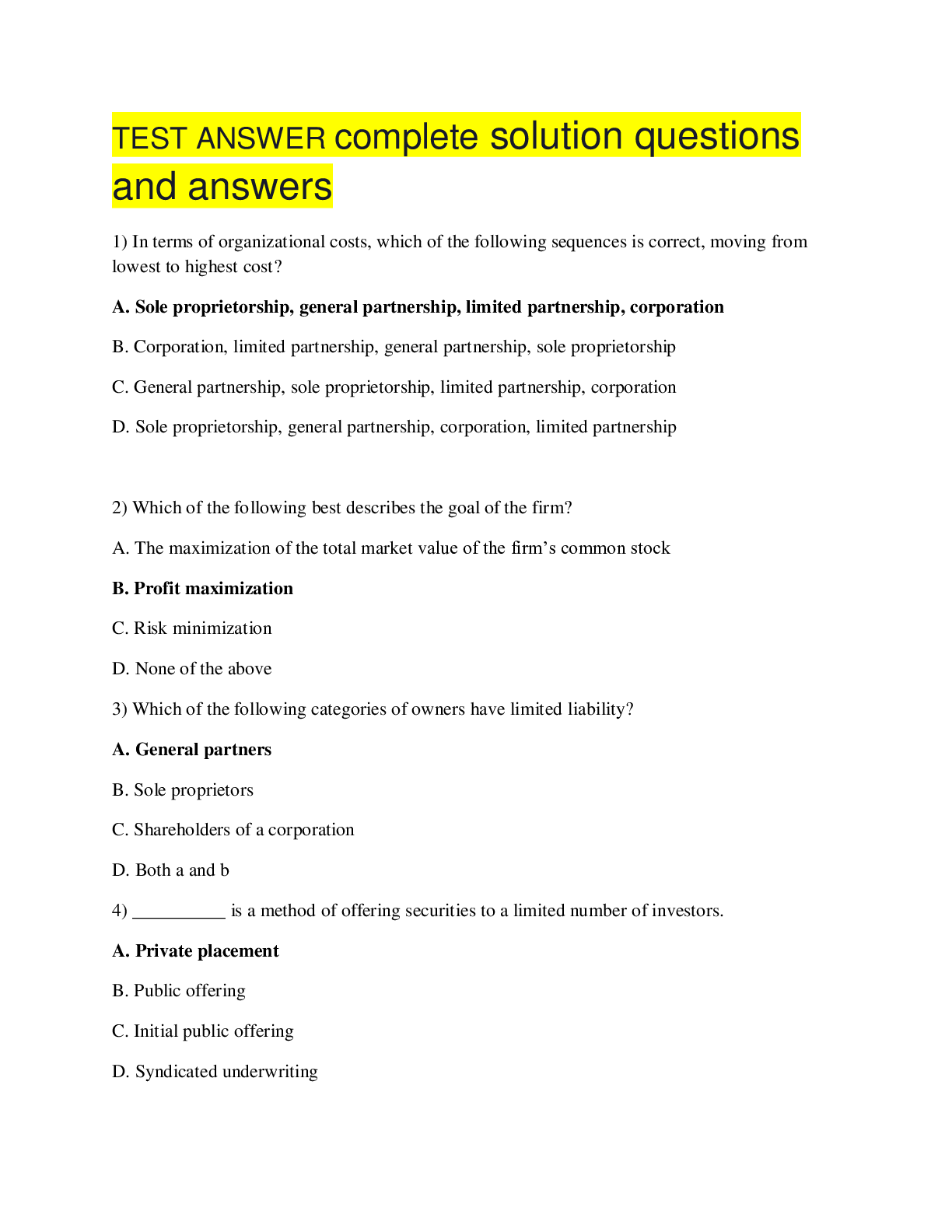




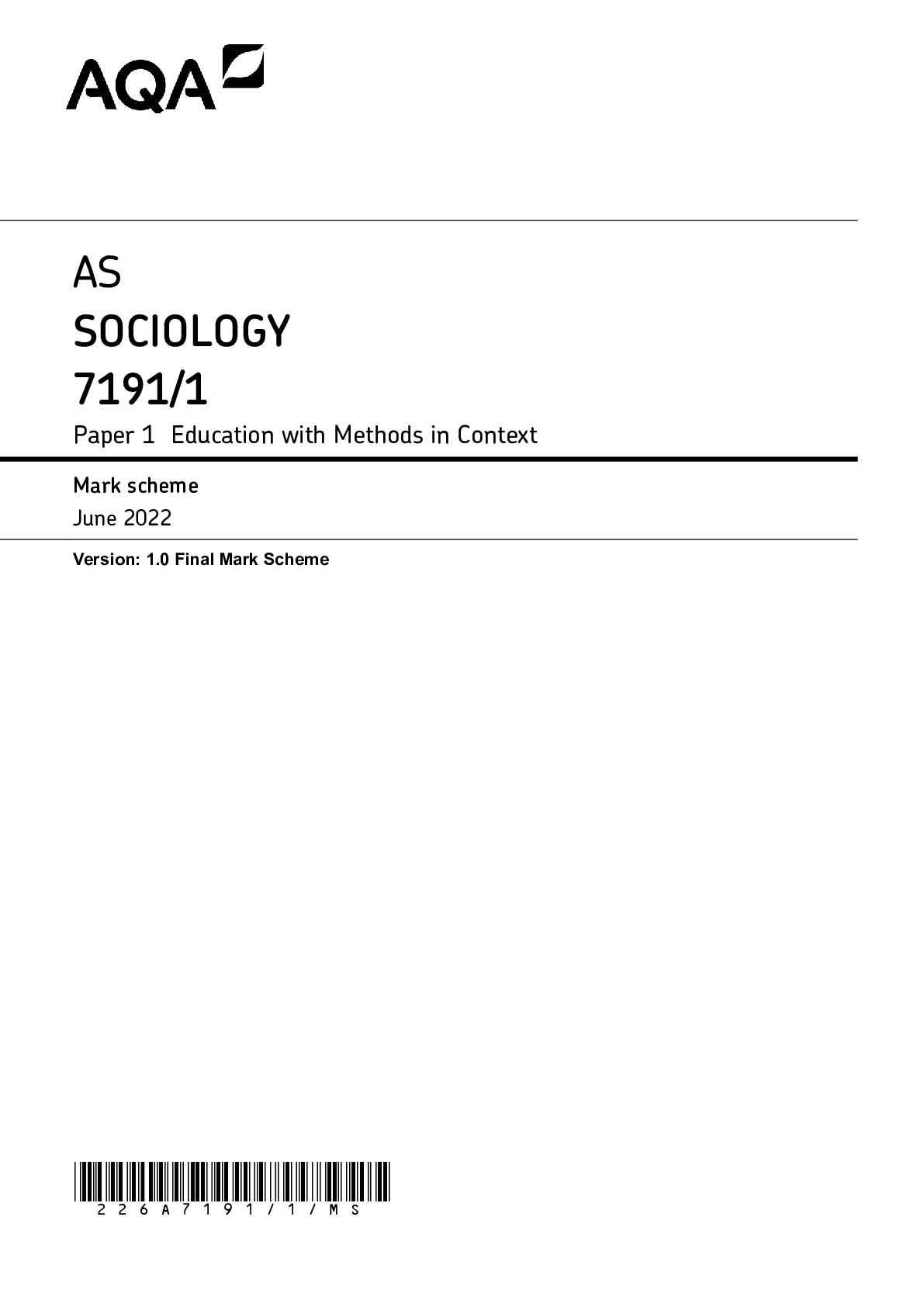
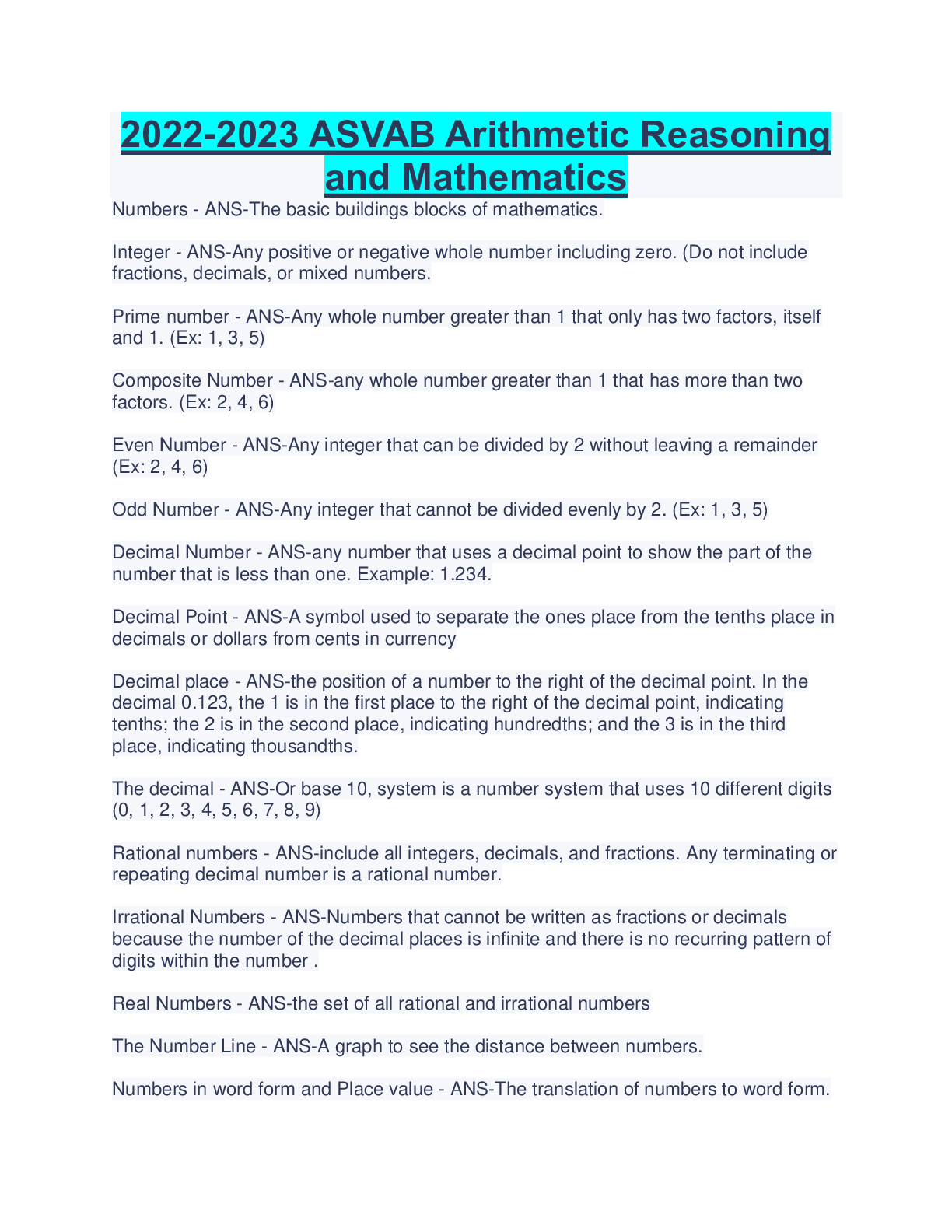




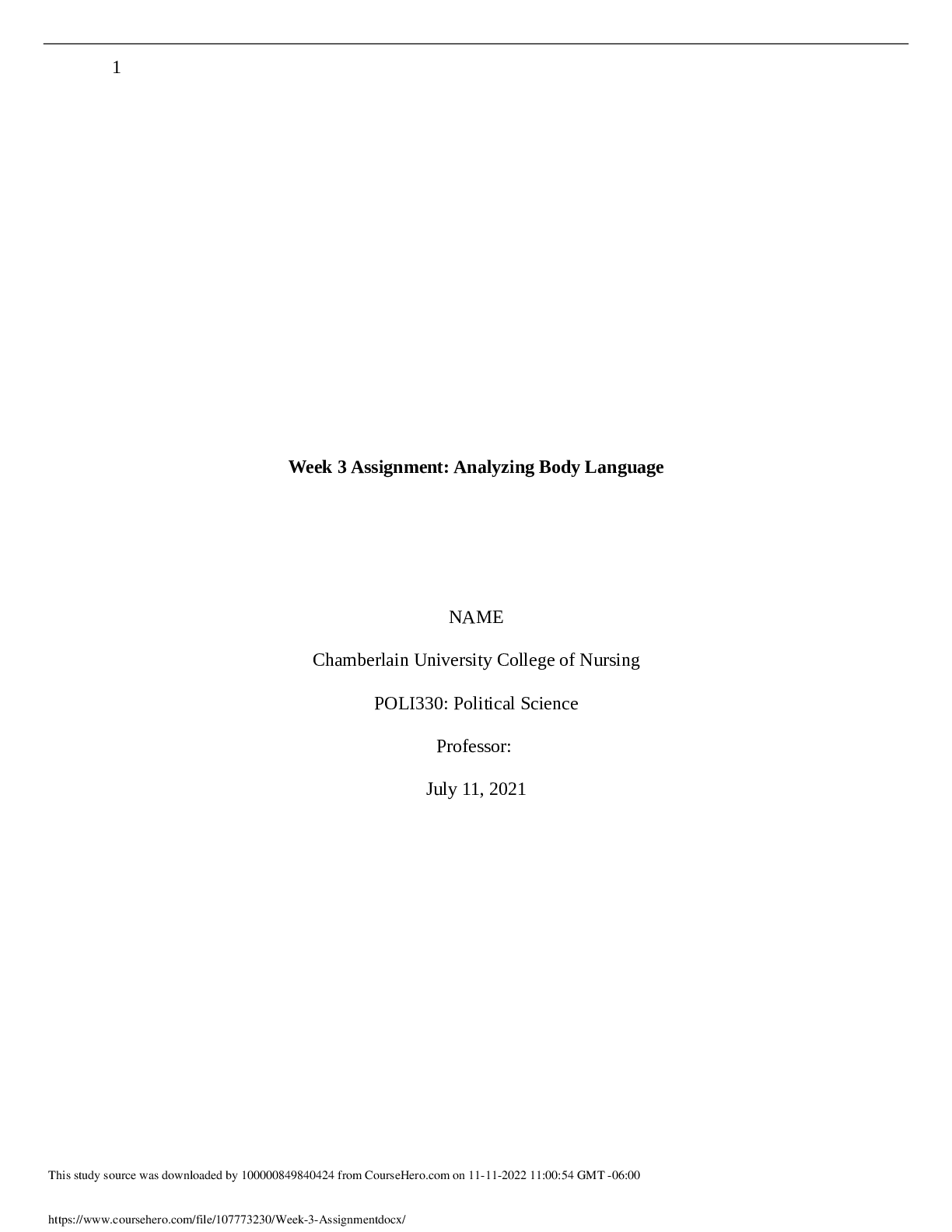
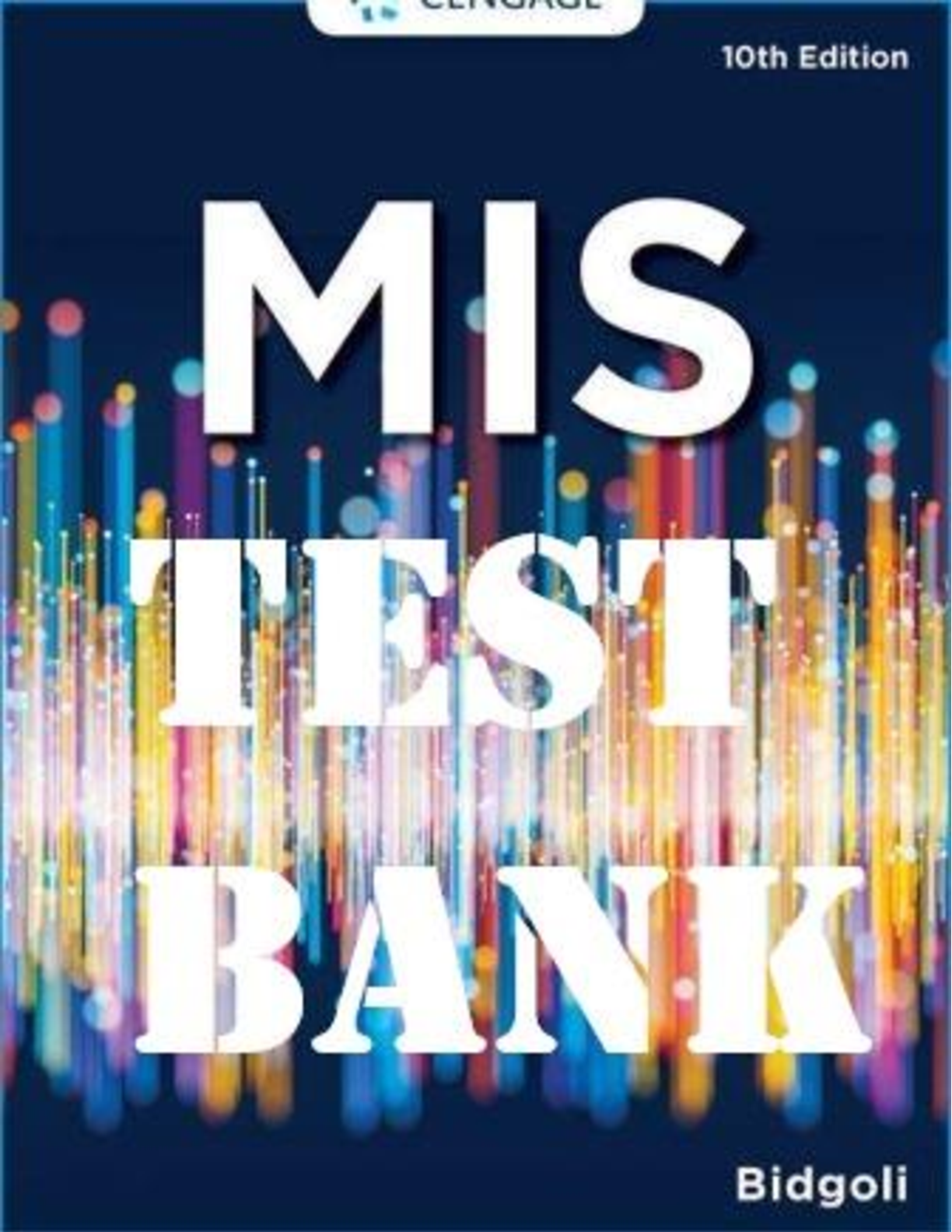
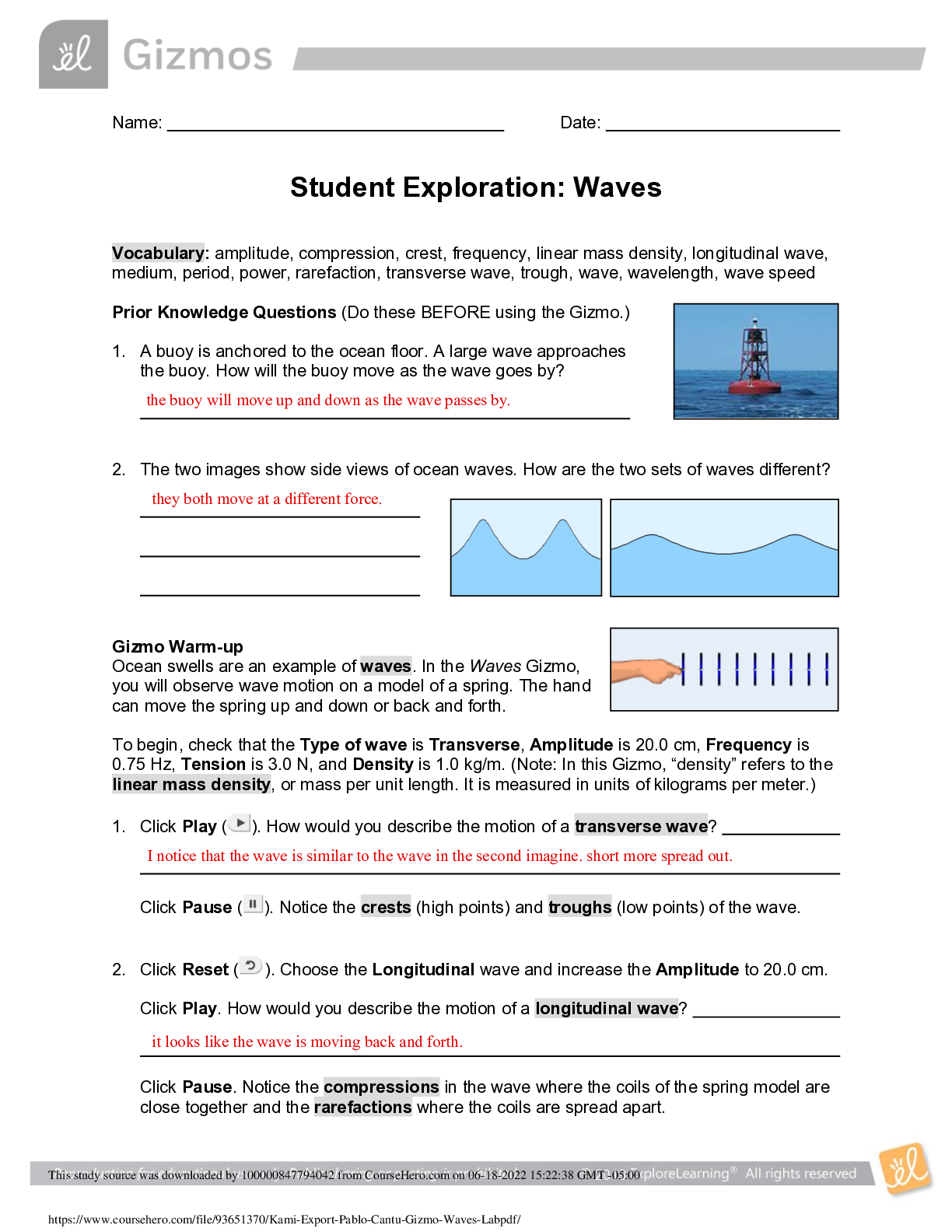
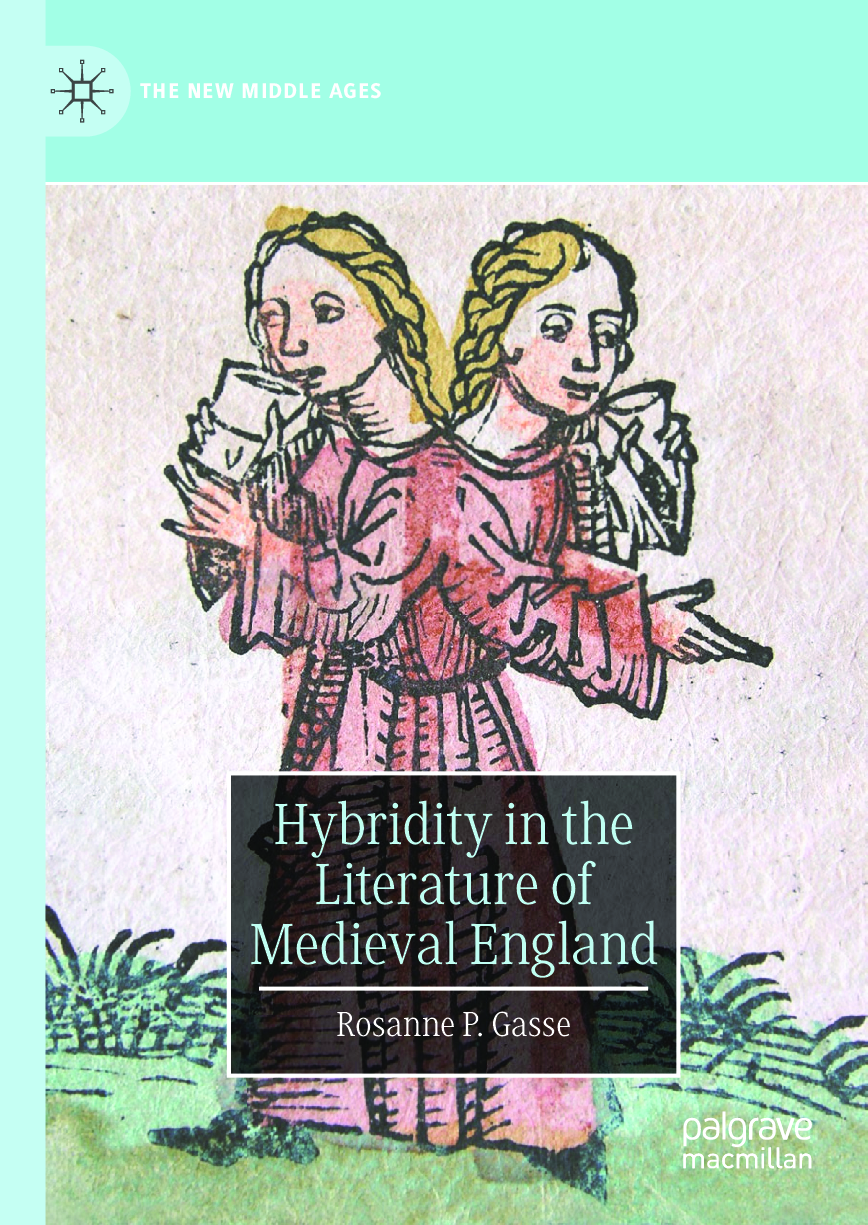

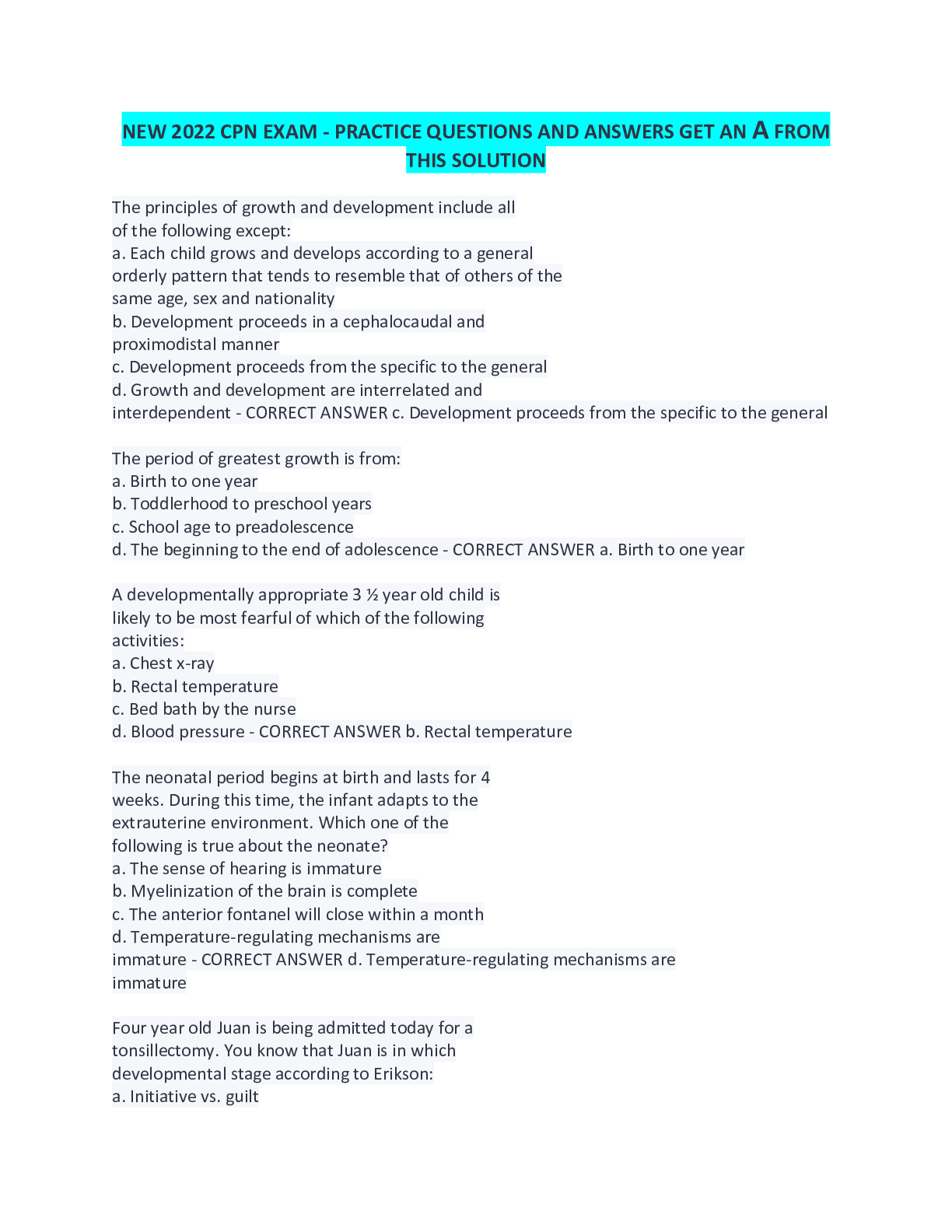

 (1).png)


.png)

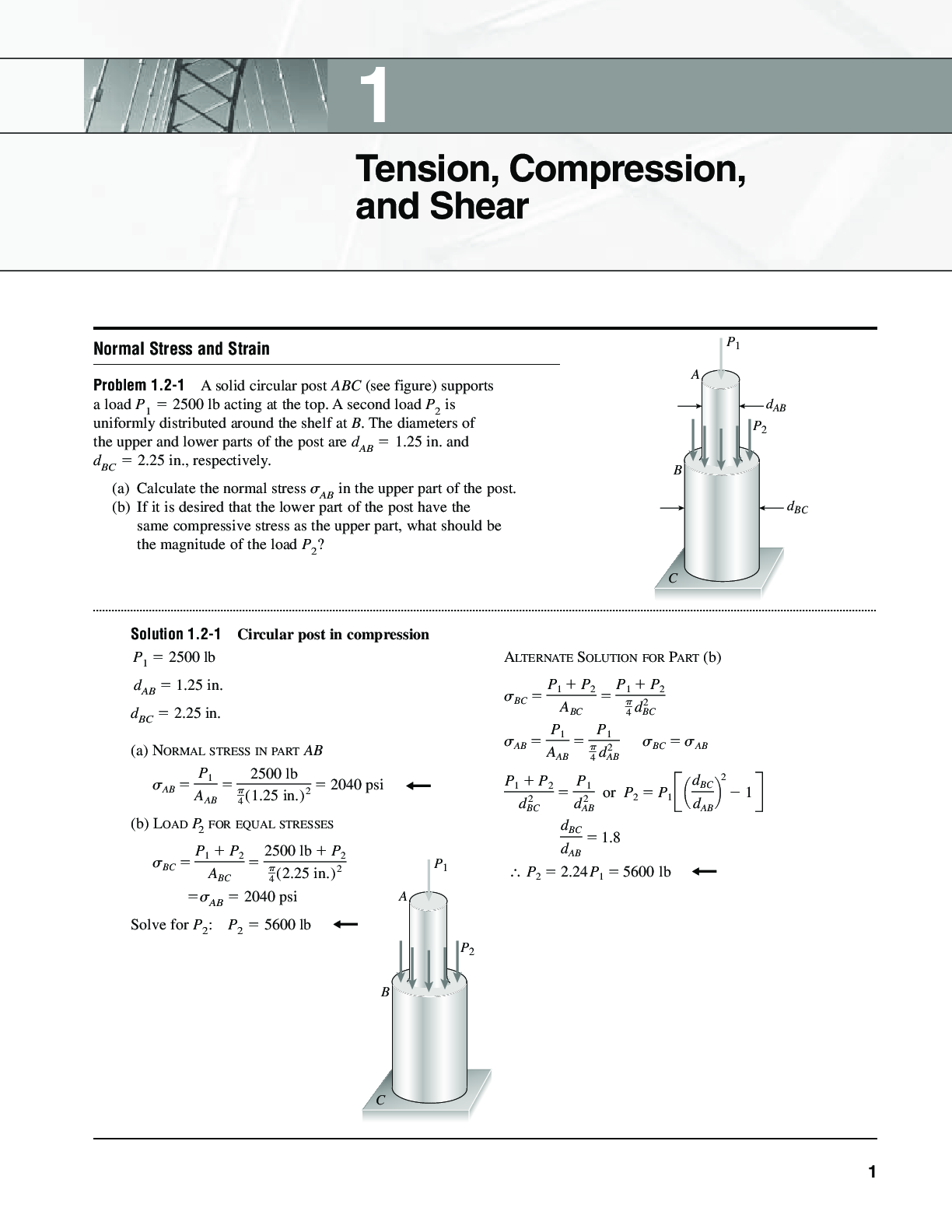
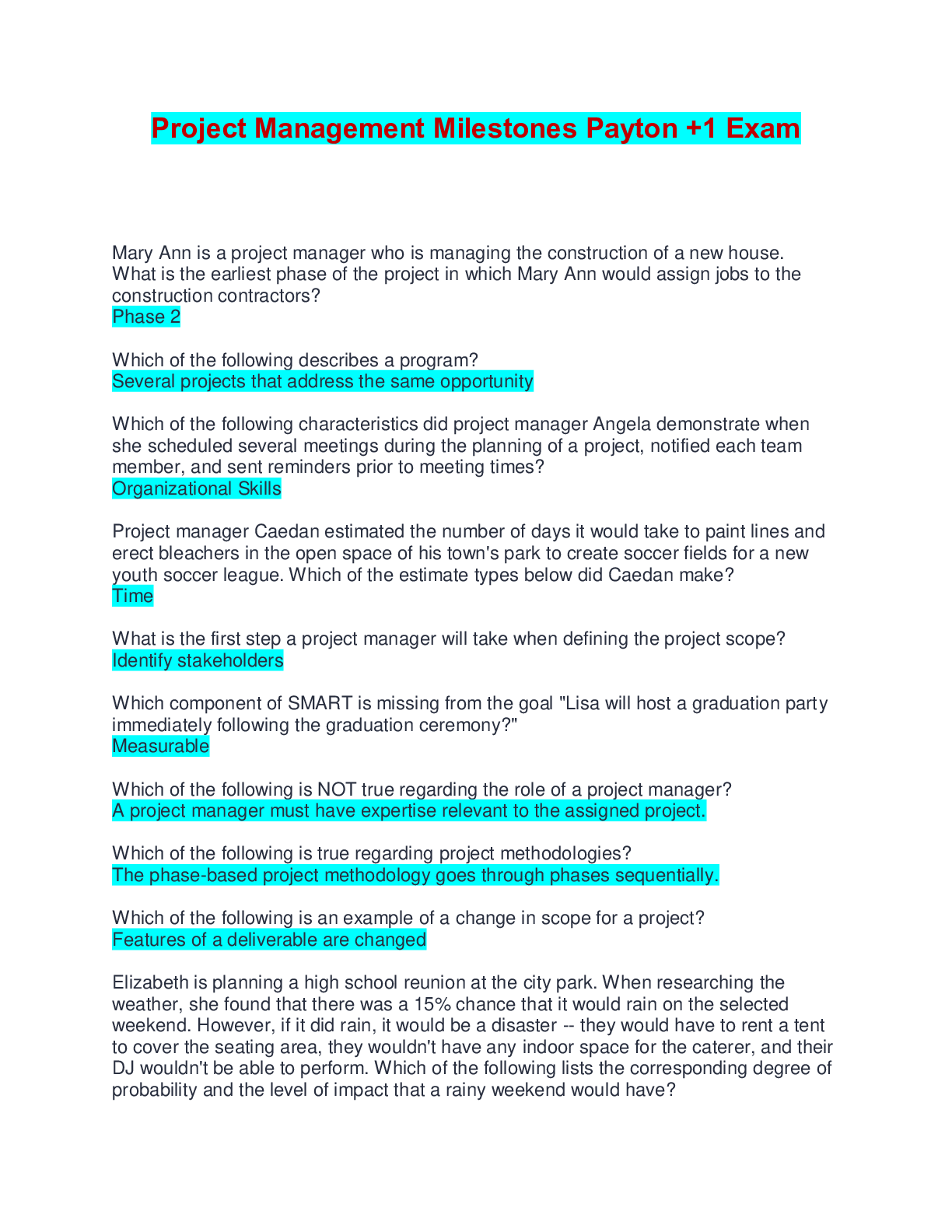

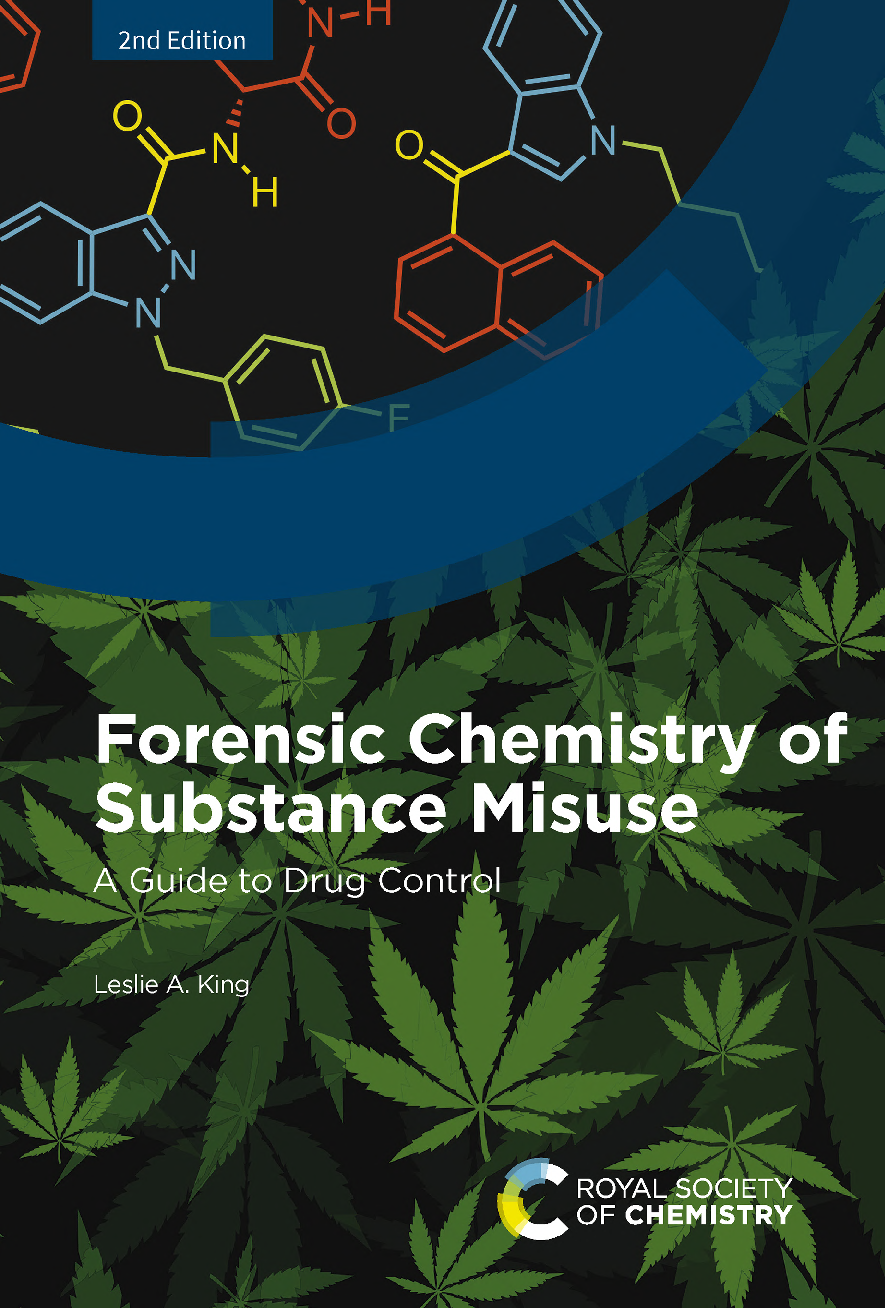
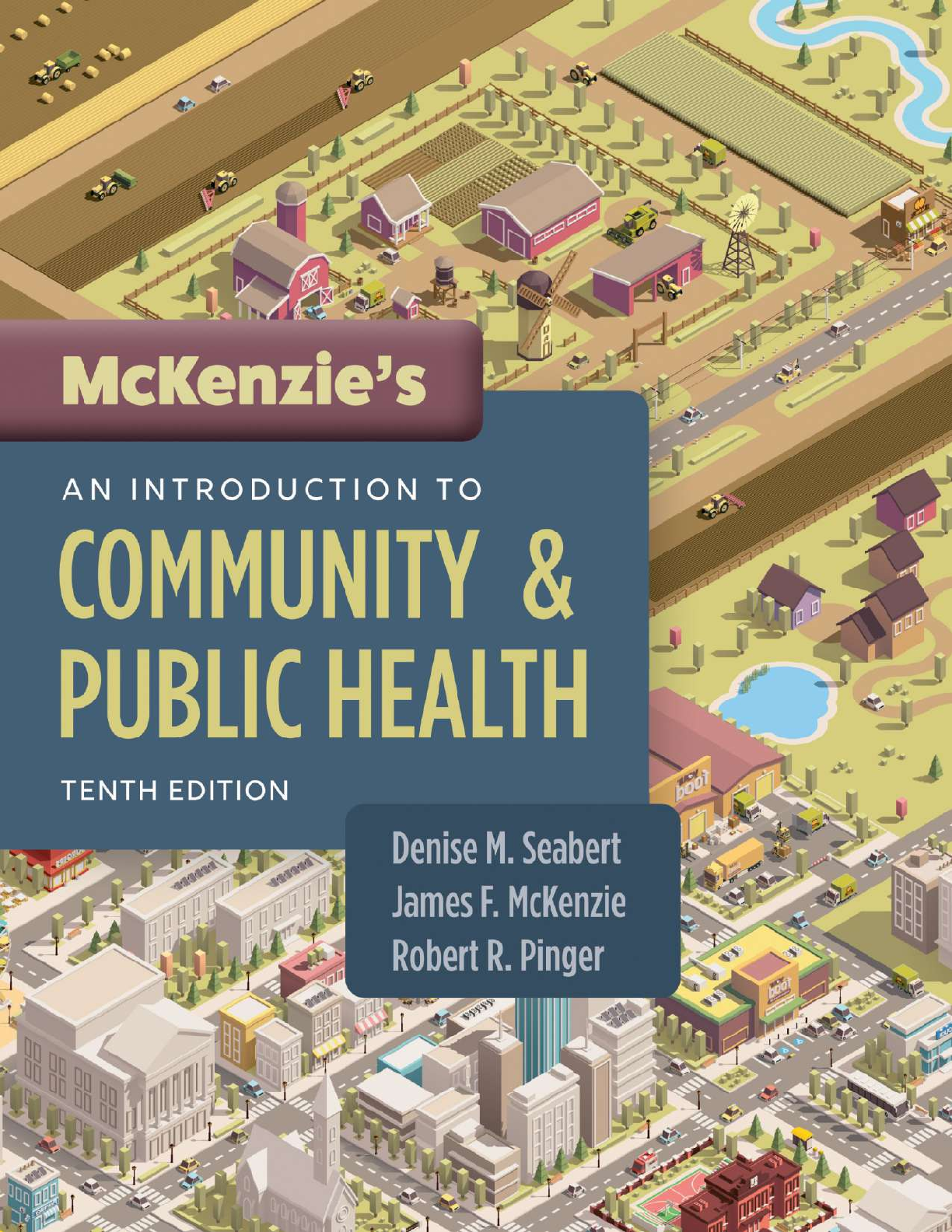
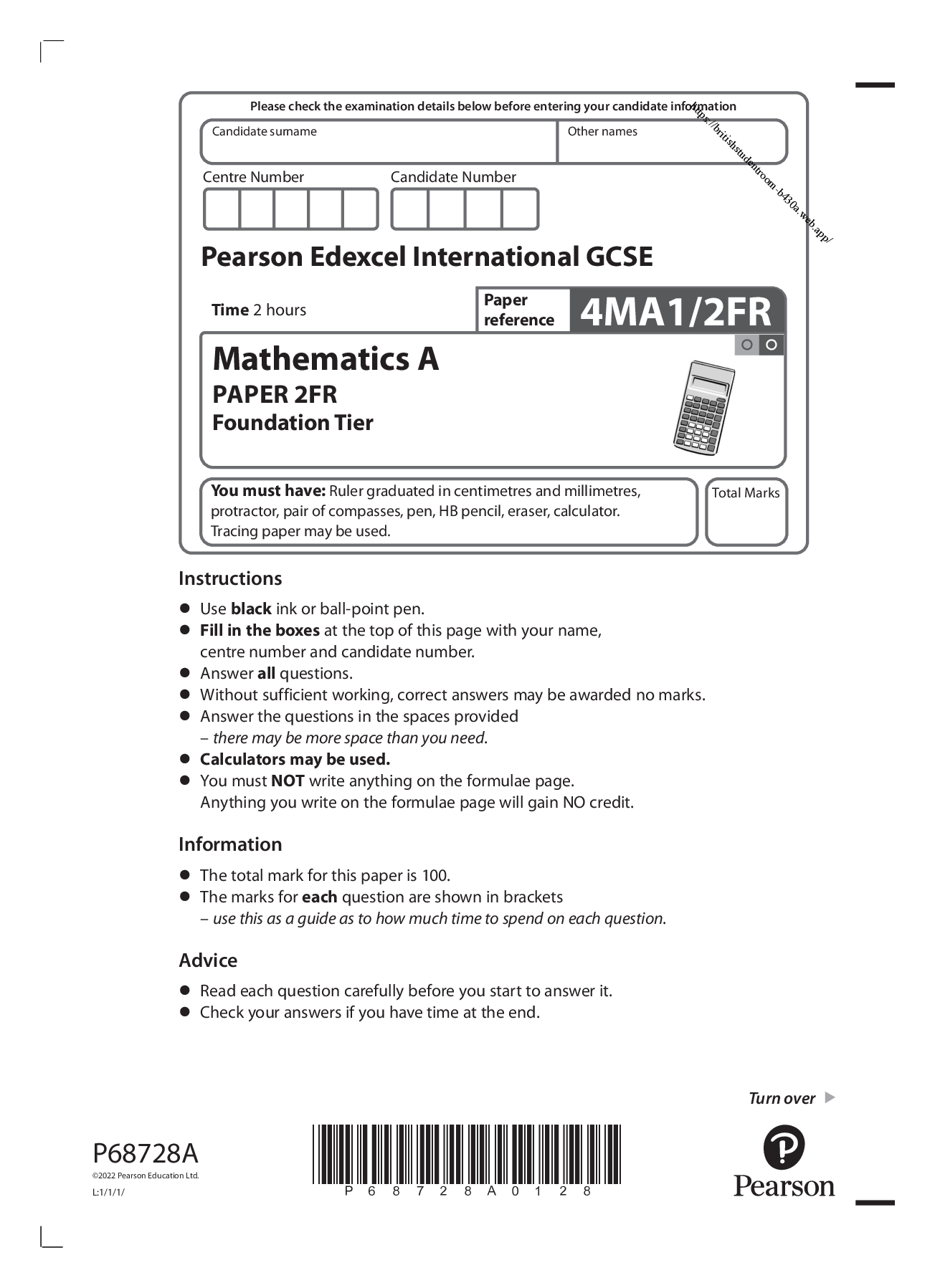

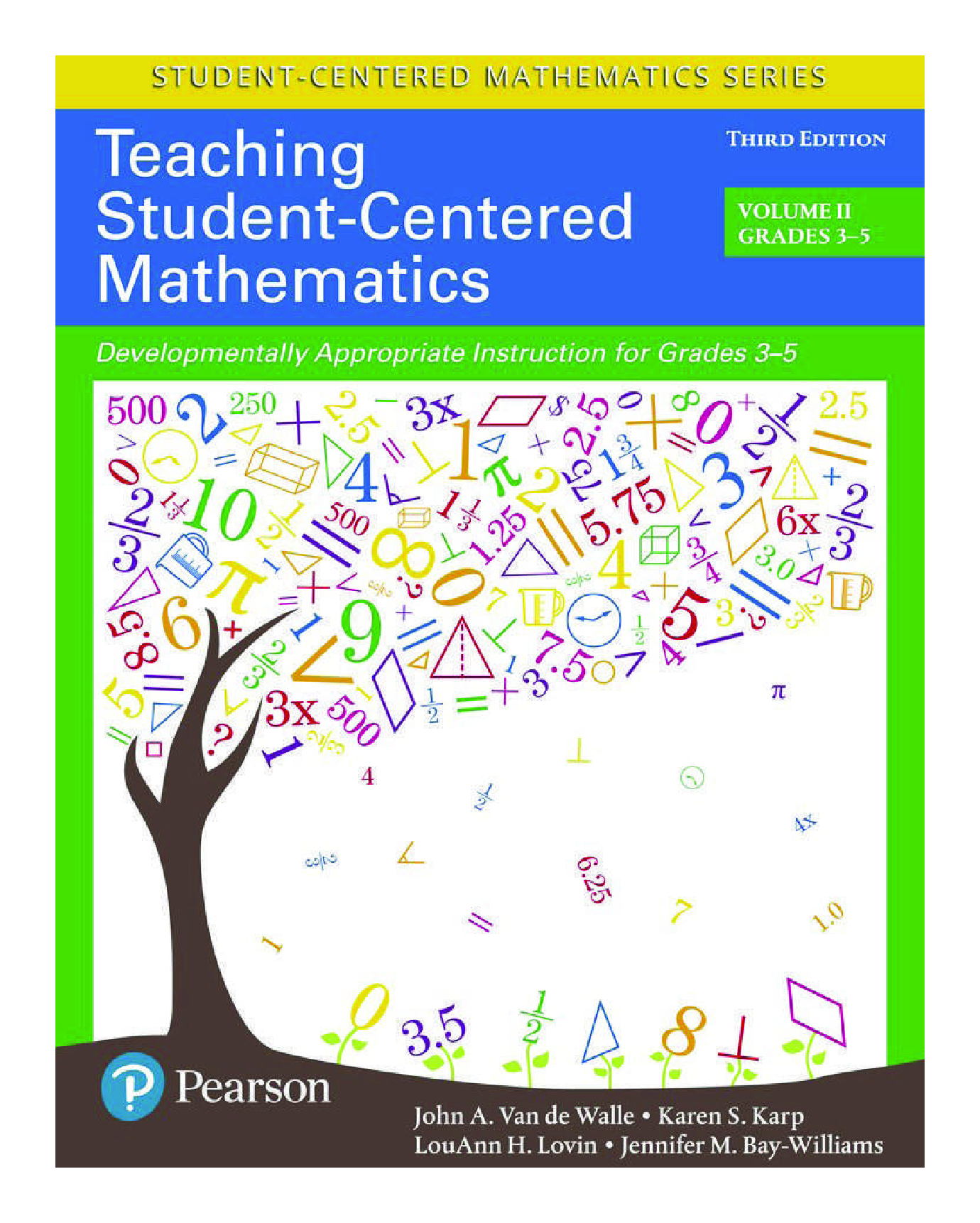
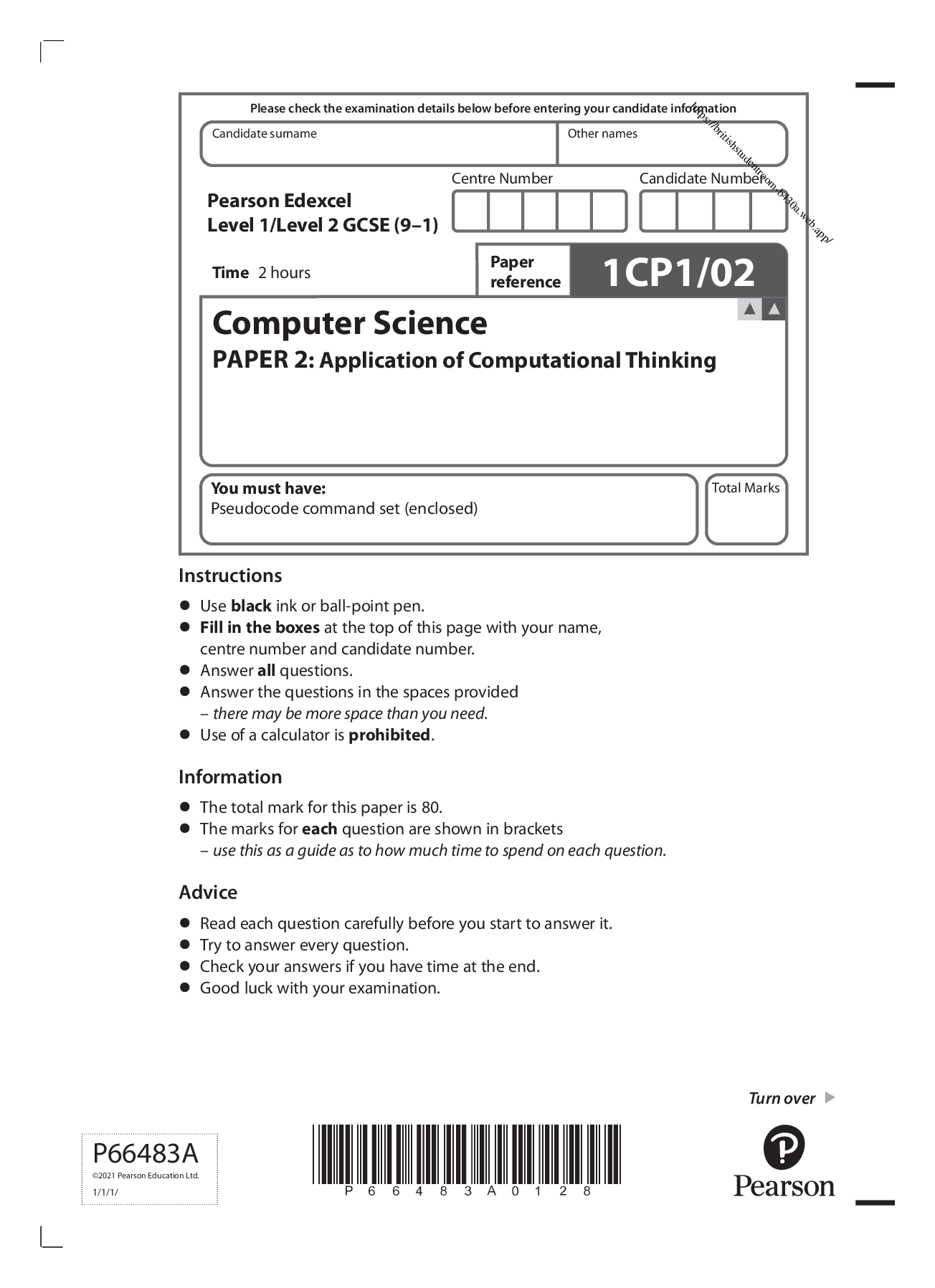

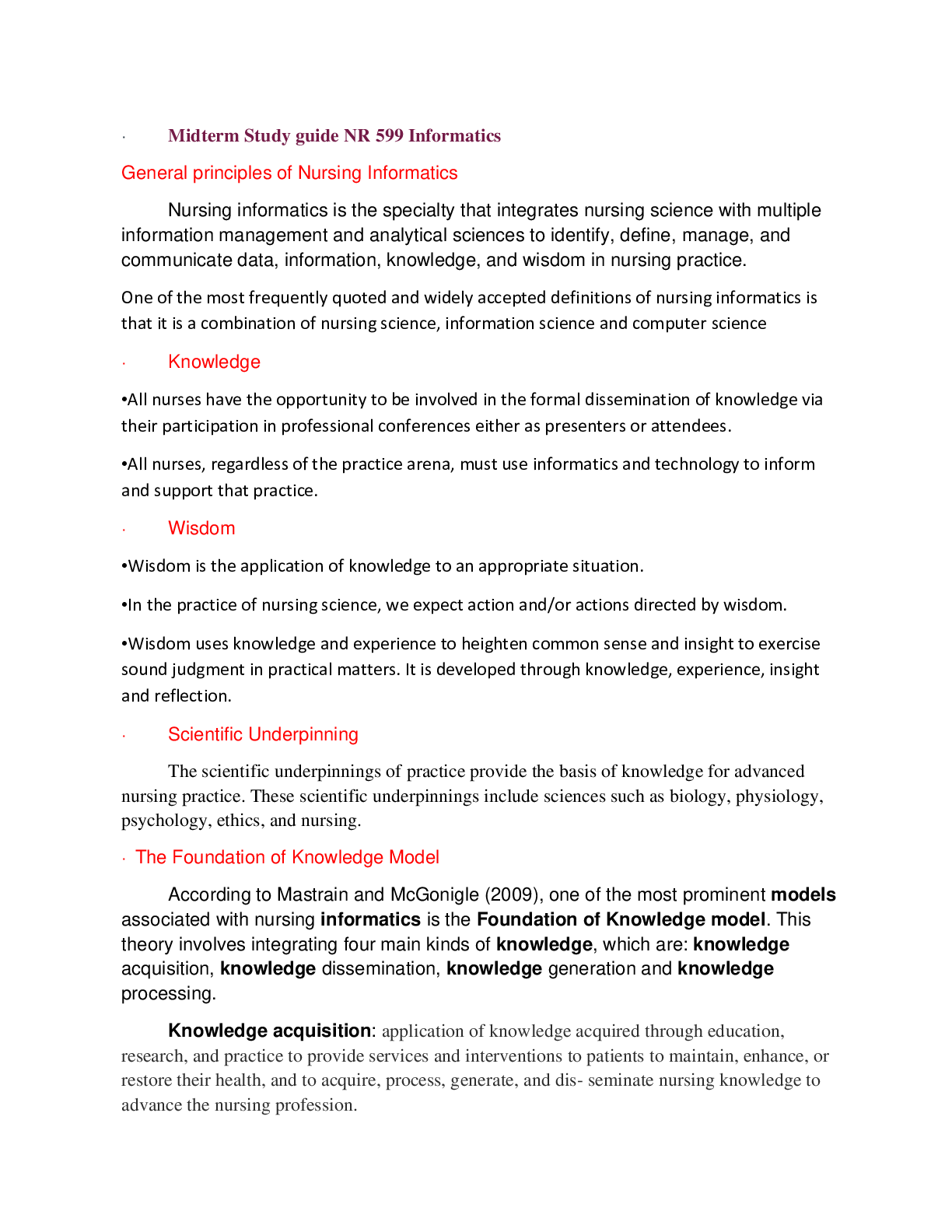

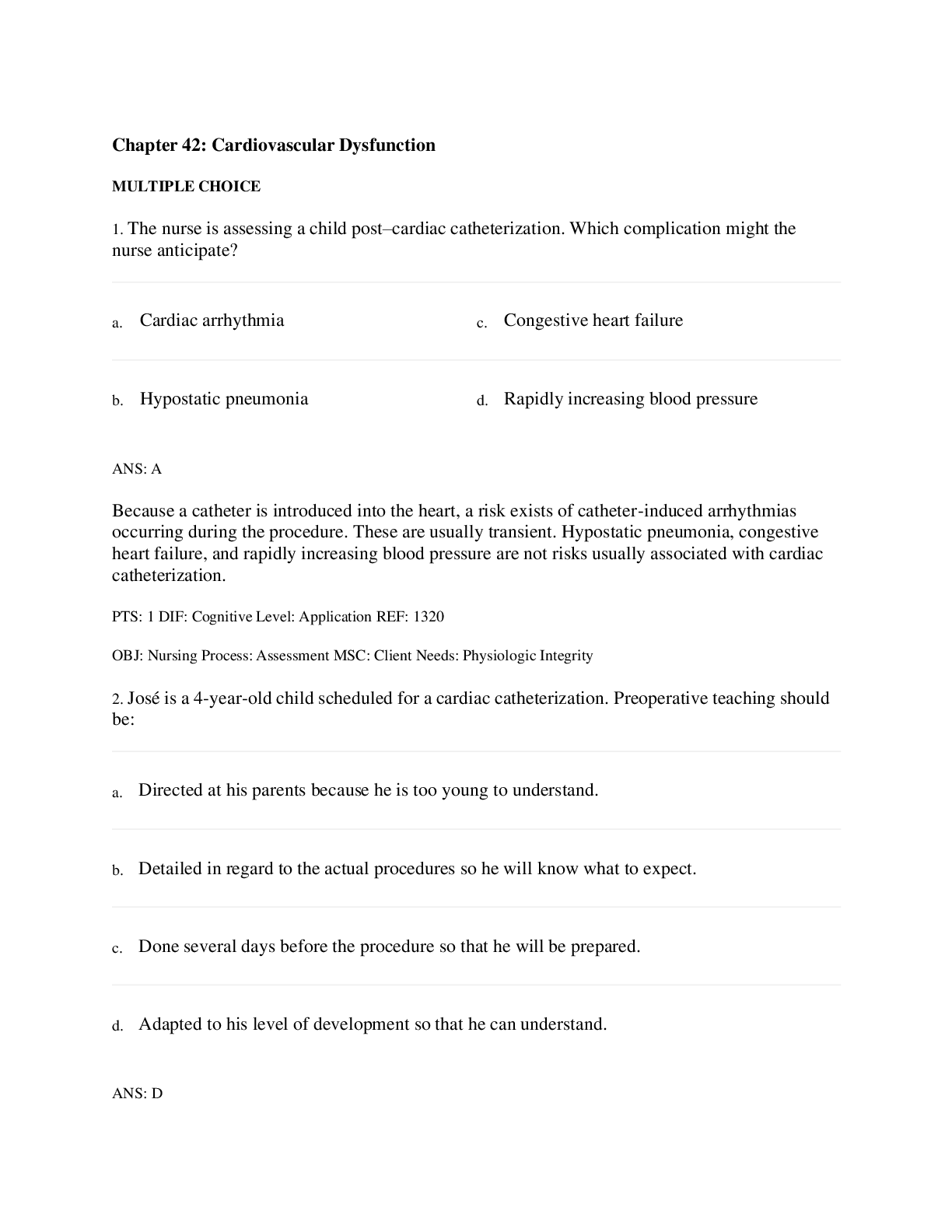
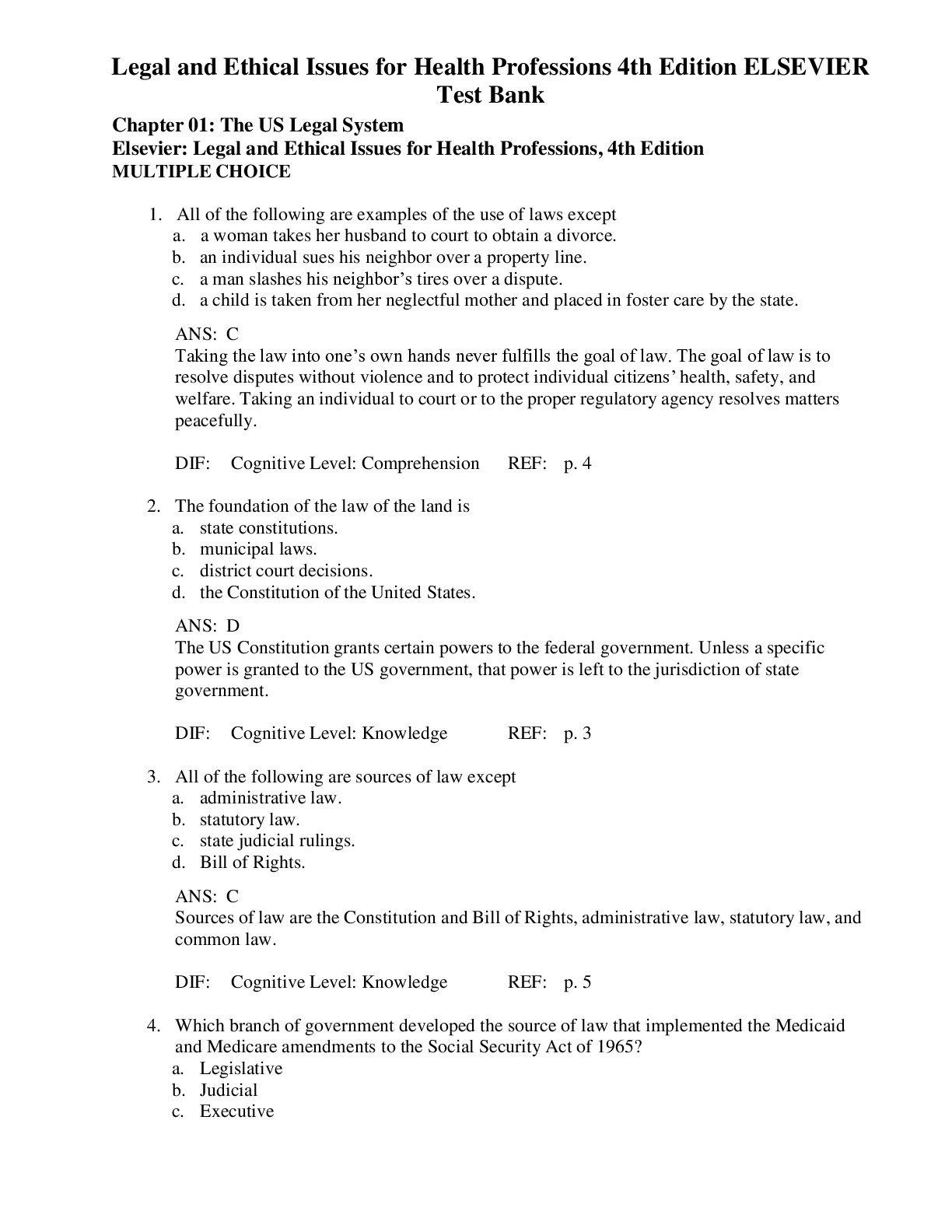

.png)





